Here are my favorite poems about fairies categorized:
- Famous poems about fairies
- Fairy poems by Shakespeare
- Poems about fairies and elves
- Poems about fairies in the garden
- Short poems about fairies
- Fairy poems for children
So if you want the best poems about fairies, then you’re in the right place.
Keep reading!
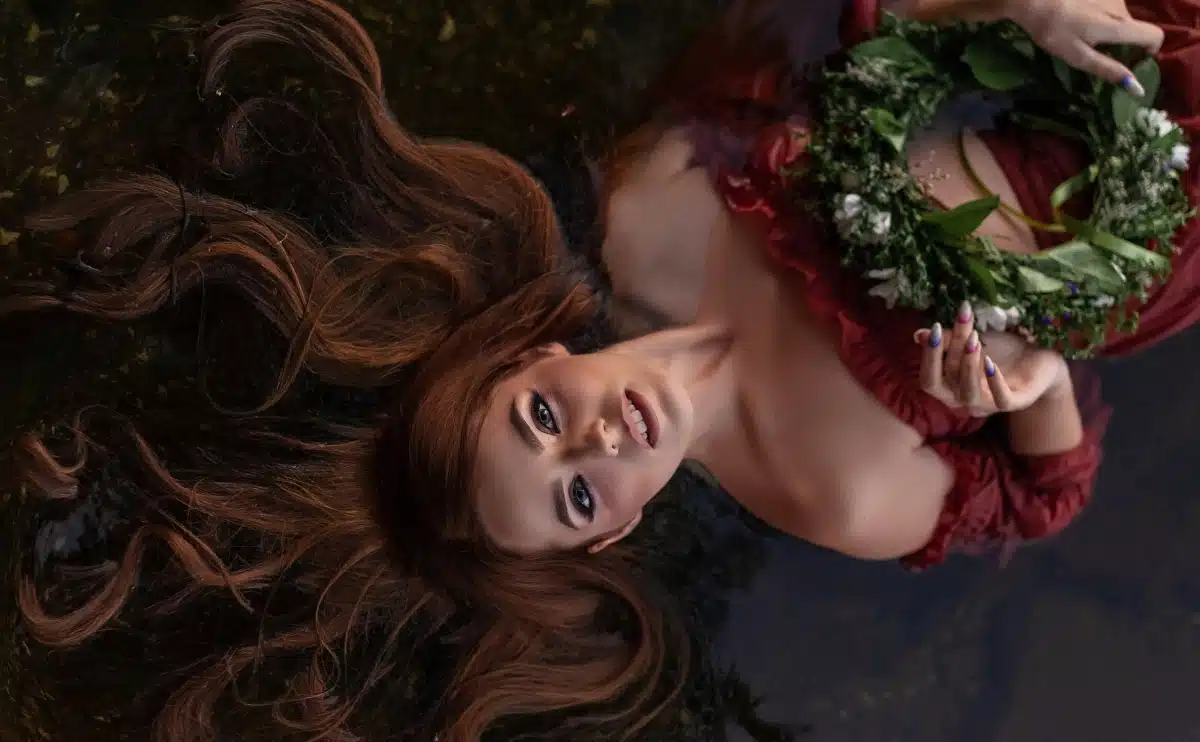
Stunning Poems About Fairies
Enter a world of enchantment with our carefully curated collection of the finest poems about fairies, categorized for your convenience.
From famous pieces that capture the essence of the magical realm, to whimsical verses perfect for children, discover the best examples of fairy poetry in one convenient location.
Our handpicked selection promises to transport you to a realm of wonder and fantasy, where the delicate charm and mischievous magic of fairies reign supreme.
Start your journey through the world of fairy poetry today and experience the magic for yourself.
Let’s dive into it!
My #1 Favorite Poem About Fairies
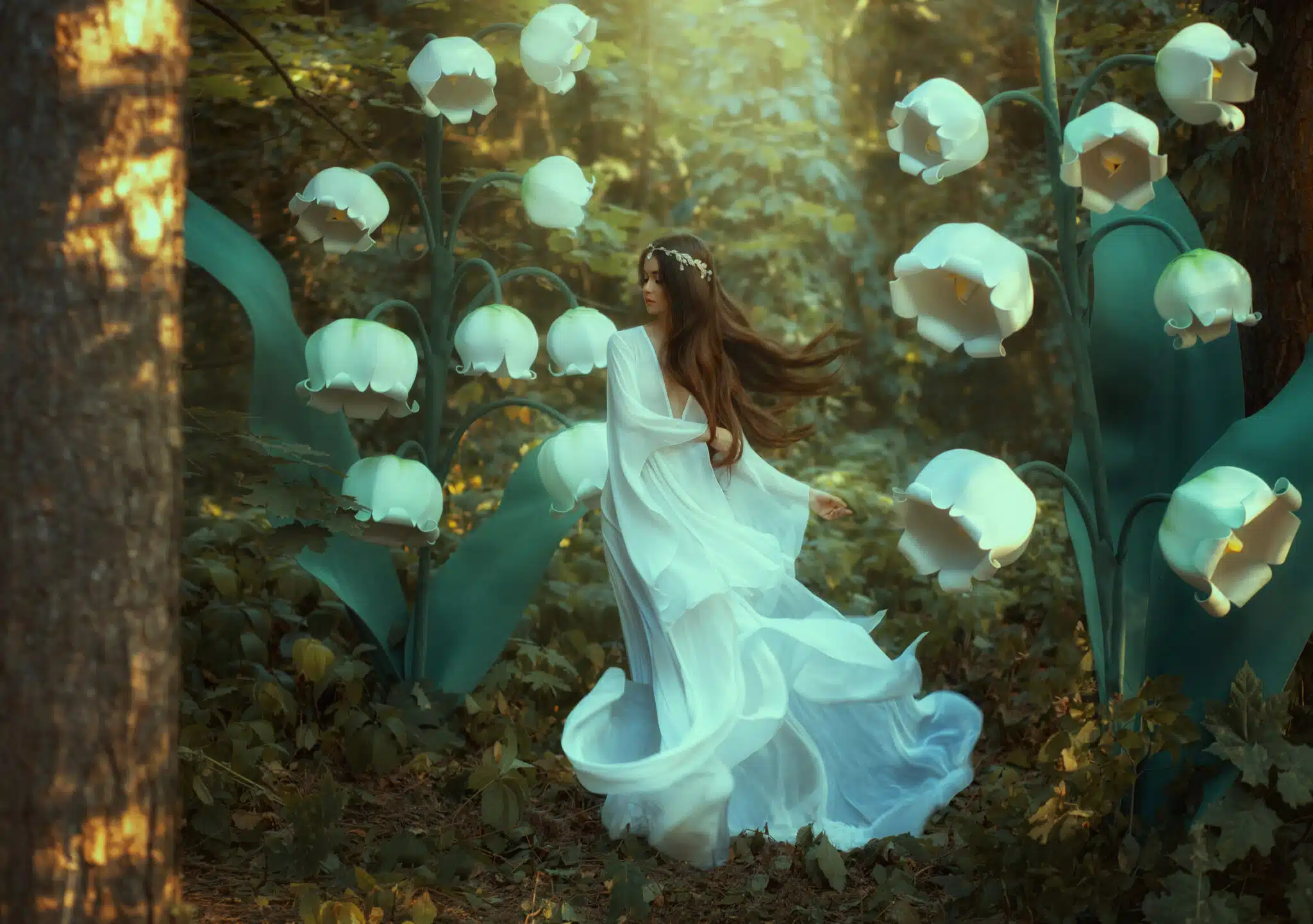
“The Fairies Dancing” by Walter De la Mare
I heard along the early hills,
Ere yet the lark was risen up,
Ere yet the dawn with firelight fills
The night-dew of the bramble-cup,
I heard the fairies in a ring
Sing as they tripped a lilting round
Soft as the moon on wavering wing.
The starlight shook as if with sound,
As if with echoing, and the stars
Prankt their bright eyes with trembling gleams
While red with war the gusty Mars
Rained upon earth his ruddy beams.
He shone alone, low down the West,
While I, behind a hawthorn-bush,
Watched on the fairies flaxen-tressed
The fires of the morning flush.
Till, as a mist, their beauty died,
Their singing shrill and fainter grew;
And daylight tremulous and wide
Flooded the moorland through and through;
Till Urdon’s copper weathercock
Was reared in golden flame afar,
And dim from moonlit dreams awoke
The towers and groves of Arroar.
Famous Poems About Fairies
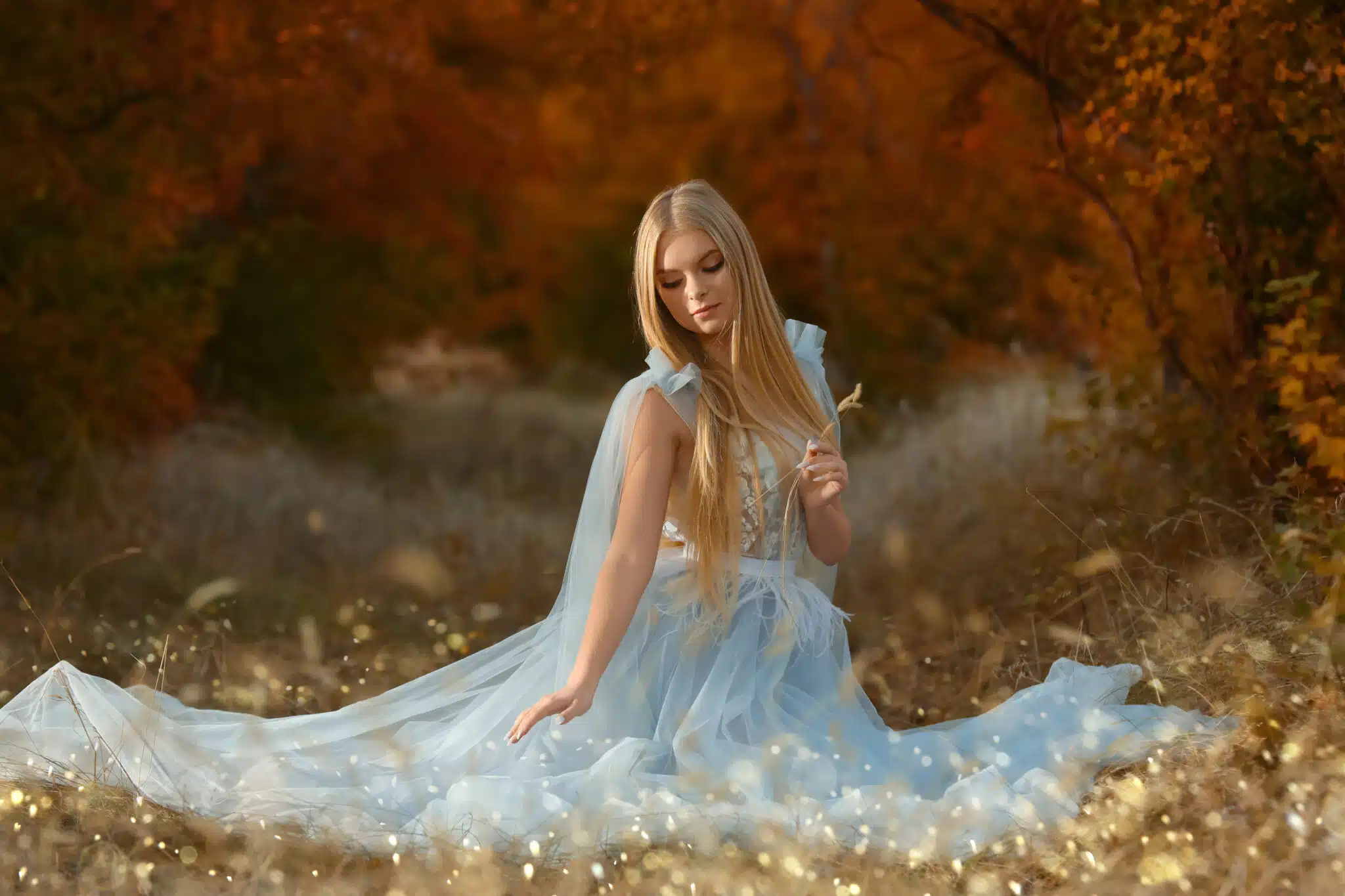
“Fairy-Land” by Edgar Allan Poe
Dim vales—and shadowy floods—
And cloudy-looking woods,
Whose forms we can’t discover
For the tears that drip all over
Huge moons there wax and wane—
Again—again—again—
Every moment of the night—
Forever changing places—
And they put out the star-light
With the breath from their pale faces.
About twelve by the moon-dial,
One more filmy than the rest
(A kind which, upon trial,
They have found to be the best)
Comes down—still down—and down,
With its centre on the crown
Of a mountain’s eminence,
While its wide circumference
In easy drapery falls
Over hamlets, over halls,
Wherever they may be—
O’er the strange woods—o’er the sea—
Over spirits on the wing—
Over every drowsy thing—
And buries them up quite
In a labyrinth of light—
And then, how deep!—O, deep!
Is the passion of their sleep.
In the morning they arise,
And their moony covering
Is soaring in the skies,
With the tempests as they toss,
Like-almost anything—
Or a yellow Albatross.
They use that moon no more
For the same end as before—
Videlicet a tent—
Which I think extravagant:
Its atomies, however,
Into a shower dissever,
Of which those butterflies,
Of Earth, who seek the skies,
And so come down again
(Never-contented things!)
Have brought a specimen
Upon their quivering wings.
“The Sirens’ Song” by William Browne
Steer hither, steer your wingèd pines,
All beaten mariners:
Here lie undiscovered mines,
A prey to passengers;
Perfumes far sweeter than the best
That make the phœnix urn and nest:
Fear not your ships,
Nor any to oppose you save our lips;
But come on shore,
Where no joy dies till love has gotten more.
For swelling waves our panting breasts,
Where never storms arise,
Exchange; and be awhile our guests:
For stars, gaze on our eyes.
The compass, love shall hourly sing;
And, as he goes about the ring,
We will not miss
To tell each point he nameth with a kiss.
“A Vision Upon the Fairy Queen” by Sir Walter Raleigh
Methought I saw the grave where Laura lay,
Within that temple where the vestal flame
Was wont to burn; and, passing by that way,
To see that buried dust of living fame,
Whose tomb fair Love, and fairer Virtue kept:
All suddenly I saw the Fairy Queen;
At whose approach the soul of Petrarch wept,
And, from thenceforth, those Graces were not seen:
For they this queen attended; in whose stead
Oblivion laid him down on Laura’s hearse:
Hereat the hardest stones were seen to bleed,
And groans of buried ghosts the heavens did pierce:
Where Homer’s spright did tremble all for grief,
And cursed the access of that celestial thief!
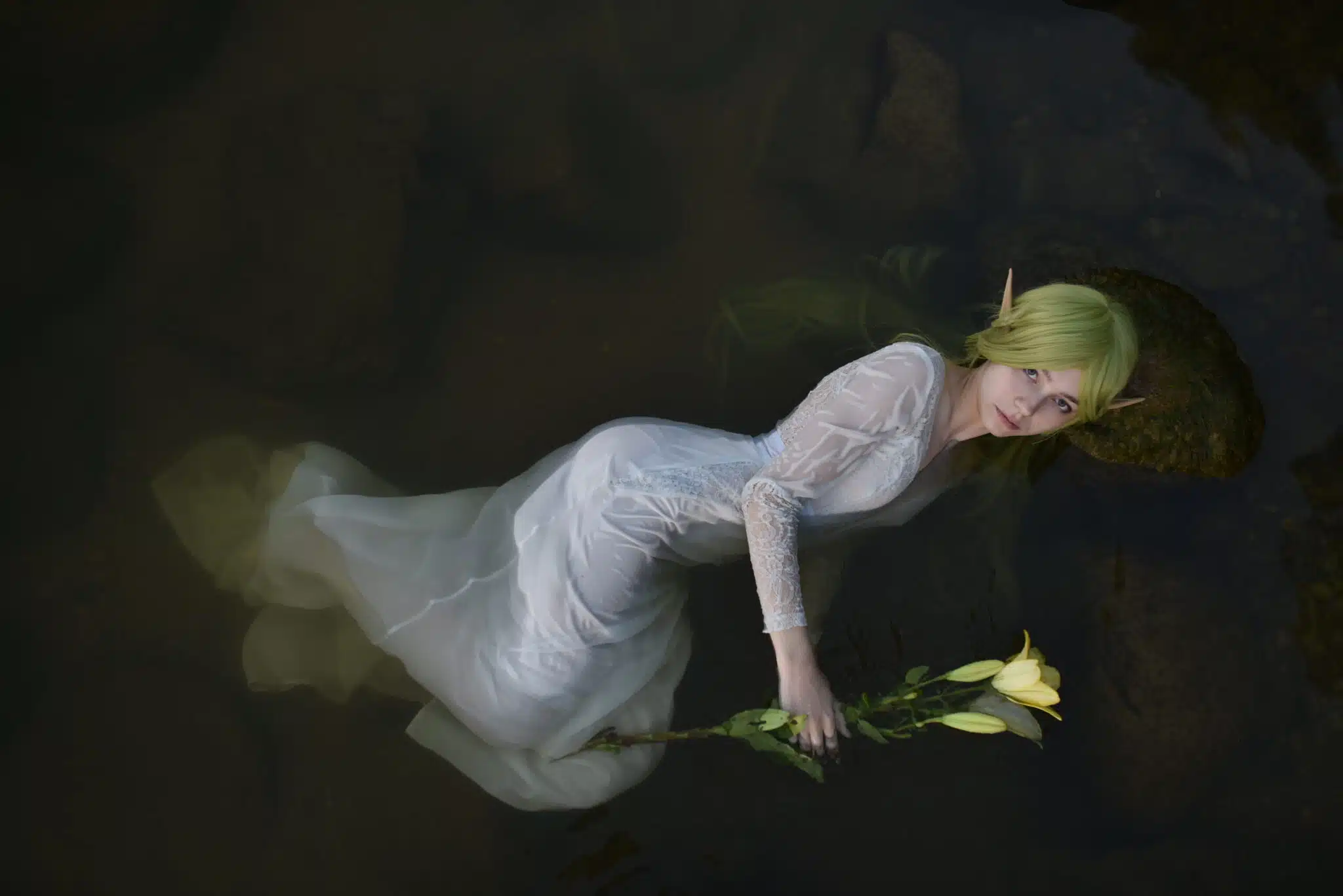
“La Belle Dame Sans Merci” by John Keats
I.
O what can ail thee, knight-at-arms,
Alone and palely loitering?
The sedge has wither’d from the lake,
And no birds sing.
II.
O what can ail thee, knight-at-arms!
So haggard and so woe-begone?
The squirrel’s granary is full,
And the harvest’s done.
III.
I see a lily on thy brow
With anguish moist and fever dew,
And on thy cheeks a fading rose
Fast withereth too.
IV.
I met a lady in the meads,
Full beautiful—a faery’s child,
Her hair was long, her foot was light,
And her eyes were wild.
V.
I made a garland for her head,
And bracelets too, and fragrant zone;
She look’d at me as she did love,
And made sweet moan.
VI.
I set her on my pacing steed,
And nothing else saw all day long,
For sidelong would she bend, and sing
A faery’s song.
VII.
She found me roots of relish sweet,
And honey wild, and manna dew,
And sure in language strange she said—
“I love thee true.”
VIII.
She took me to her elfin grot,
And there she wept, and sigh’d fill sore,
And there I shut her wild wild eyes
With kisses four.
IX.
And there she lulled me asleep,
And there I dream’d—Ah! woe betide!
The latest dream I ever dream’d
On the cold hill’s side.
X.
I saw pale kings and princes too,
Pale warriors, death-pale were they all;
They cried—“La Belle Dame sans Merci
Hath thee in thrall!”
XI.
I saw their starved lips in the gloam,
With horrid warning gaped wide,
And I awoke and found me here,
On the cold hill’s side.
XII.
And this is why I sojourn here,
Alone and palely loitering,
Though the sedge is wither’d from the lake,
And no birds sing.
“The Faerie Queene” by Edmund Spenser
IV
A lovely Ladie rode him faire beside,
Upon a lowly Asse more white then snow,
Yet she much whiter, but the same did hide
Under a vele, that wimpled was full low,
And over all a blacke stole she did throw,
As one that inly mournd: so was she sad,
And heavie sat upon her palfrey slow;
Seemed in heart some hidden care she had,
And by her in a line a milke white lambe she lad.
V
So pure and innocent, as that same lambe,
She was in life and every vertuous lore,
And by descent from Royall lynage came
Of ancient Kings and Queenes, that had of yore
Their scepters stretcht from East to Westerne shore,
And all the world in their subjection held;
Till that infernall feend with foule uprore
Forwasted all their land, and them expeld:
Whom to avenge, she had this Knight from far compeld.
VI
Behind her farre away a Dwarfe° did lag,
That lasie seemd in being ever last,
Or wearied with bearing of her bag
Of needments at his backe. Thus as they past,
The day with cloudes was suddeine overcast,
And angry Jove an hideous storme of raine
Did poure into his Lemans lap so fast,
That everie wight to shrowd it did constrain,
And this faire couple eke to shroud themselves were fain.
“Faerie” by Emma Lazarus
From the oped lattice glance once more abroad
While the ethereal moontide bathes with light
Hill, stream, and garden, and white-winding road.
All gracious myths born of the shadowy night
Recur, and hover in fantastic guise,
Airy and vague, before the drowsy sight.
On yonder soft gray hill Endymion lies
In rosy slumber, and the moonlit air
Breathes kisses on his cheeks and lips and eyes.
‘Twixt bush and bush gleam flower-white limbs, left bare,
Of huntress-nymphs, and flying raiment thin,
Vanishing faces, and bright floating hair.
The quaint midsummer fairies and their kin,
Gnomes, elves, and trolls, on blossom, branch, and grass
Gambol and dance, and winding out and in
Leave circles of spun dew where’er they pass.
Through the blue ether the freed Ariel flies;
Enchantment holds the air; a swarming mass
Of myriad dusky, gold-winged dreams arise,
Throng toward the gates of sense, and so possess
The soul, and lull it to forgetfulness.
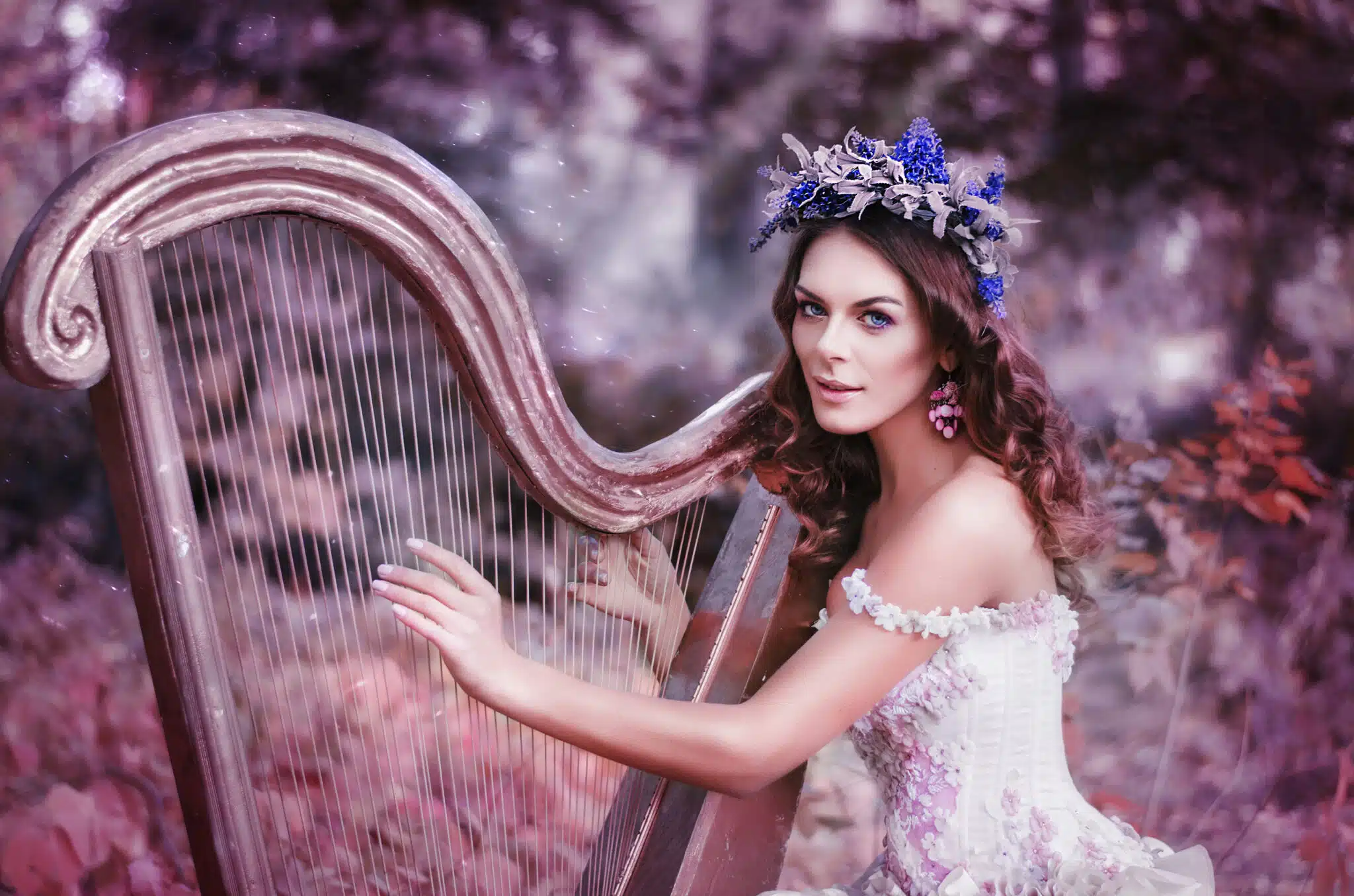
“Fairy Song” by Louisa May Alcott
The moonlight fades from flower and rose
And the stars dim one by one;
The tale is told, the song is sung,
And the Fairy feast is done.
The night-wind rocks the sleeping flowers,
And sings to them, soft and low.
The early birds erelong will wake:
‘T is time for the Elves to go.
O’er the sleeping earth we silently pass,
Unseen by mortal eye,
And send sweet dreams, as we lightly float
Through the quiet moonlit sky;—
For the stars’ soft eyes alone may see,
And the flowers alone may know,
The feasts we hold, the tales we tell;
So’t is time for the Elves to go.
From bird, and blossom, and bee,
We learn the lessons they teach;
And seek, by kindly deeds, to win
A loving friend in each.
And though unseen on earth we dwell,
Sweet voices whisper low,
And gentle hearts most joyously greet
The Elves where’er they go.
When next we meet in the Fairy dell,
May the silver moon’s soft light
Shine then on faces gay as now,
And Elfin hearts as light.
Now spread each wing, for the eastern sky
With sunlight soon shall glow.
The morning star shall light us home:
Farewell! for the Elves must go.
“A Faery Song” by William Butler Yeats
We who are old, old and gay,
O so old!
Thousands of years, thousands of years,
If all were told:
Give to these children, new from the world,
Silence and love;
And the long dew-dropping hours of the night,
And the stars above:
Give to these children, new from the world,
Rest far from men.
Is anything better, anything better?
Tell us it then:
Us who are old, old and gay,
O so old!
Thousands of years, thousands of years,
If all were told.
“The Fairy in Winter” by Walter De La Mare
There was a Fairy – flake of winter –
Who, when the snow came, whispering, Silence,
Sister crystal to crystal sighing,
Making of meadow argent palace,
Night a star-sown solitude,
Cried ‘neath her frozen eaves, “I burn here!”
Wings diaphanous, beating bee-like,
Wand within fingers, locks enspangled,
Icicle foot, lip sharp as scarlet,
She lifted her eyes in her pitch-black hollow –
Green as stalks of weeds in water –
Breathed: stirred.
Rilled from her heart the ichor, coursing,
Flamed and awoke her slumbering magic.
Softlier than moth’s her pinions trembled;
Out into blackness, light-like, she flittered,
Leaving her hollow cold, forsaken.
In air, o’er crystal, rang twangling night-wind.
Bare, rimed pine-woods murmured lament.
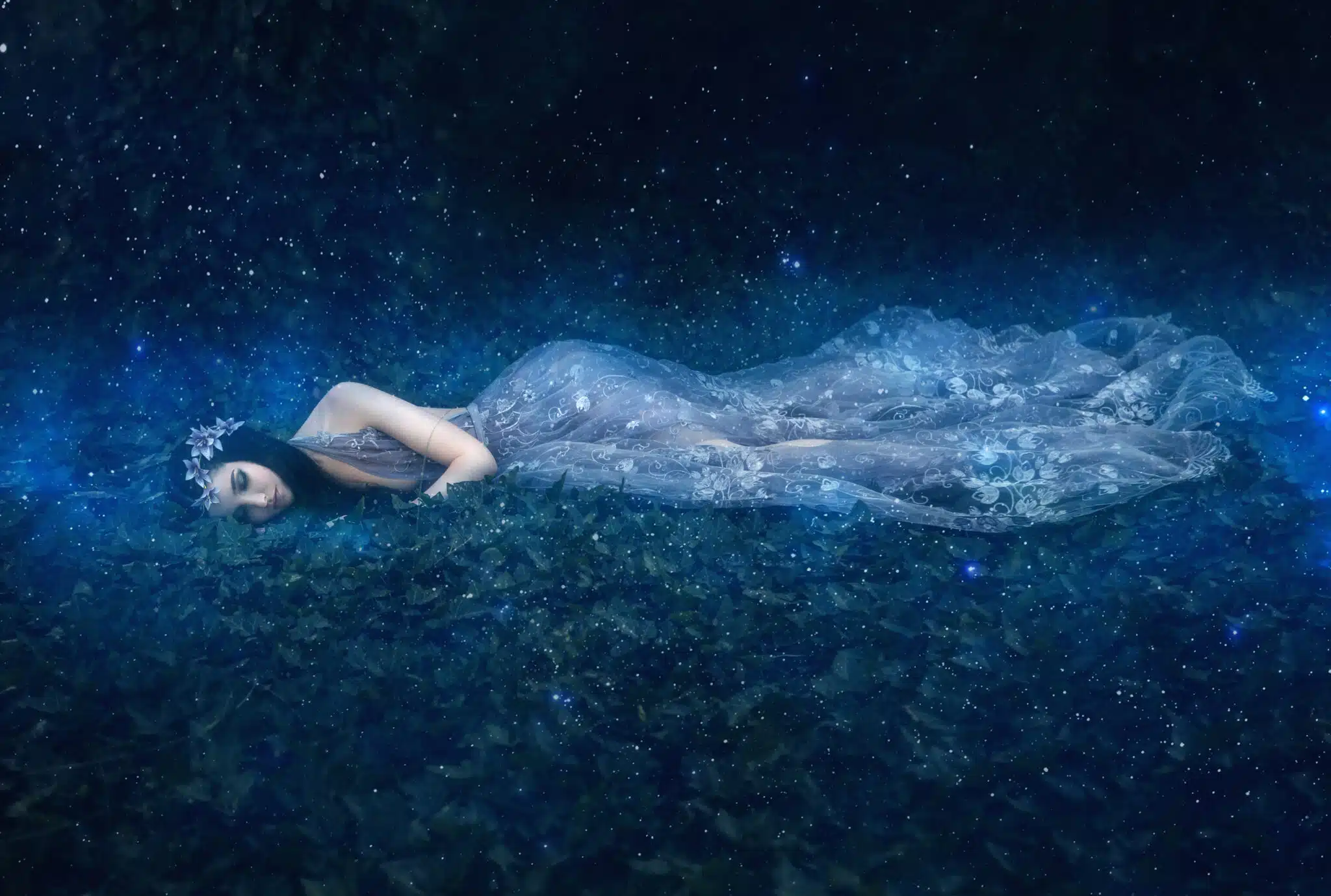
“A Fairy Lullaby” by Eugene Field
There are two stars in yonder steeps
That watch the baby while he sleeps.
But while the baby is awake
And singing gayly all day long,
The little stars their slumbers take
Lulled by the music of his song.
So sleep, dear tired baby, sleep
While little stars their vigils keep.
Beside his loving mother-sheep
A little lambkin is asleep;
What does he know of midnight gloom—
He sleeps, and in his quiet dreams
He thinks he plucks the clover bloom
And drinks at cooling, purling streams.
And those same stars the baby knows
Sing softly to the lamb’s repose.
Sleep, little lamb; sleep, little child–
The stars are dim–the night is wild;
But o’er the cot and o’er the lea
A sleepless eye forever beams–
A shepherd watches over thee
In all thy little baby dreams;
The shepherd loves his tiny sheep–
Sleep, precious little lambkin, sleep!
“The Lore-Lei” by Heinrich Heine (Anonymous, Translator)
I know not whence it rises,
This thought so full of woe;—
But a tale of times departed
Haunts me—and will not go.
The air is cool, and it darkens,
And calmly flows the Rhine;
The mountain peaks are sparkling
In the sunny evening-shine.
And yonder sits a maiden,
The fairest of the fair;
With gold is her garment glittering,
And she combs her golden hair.
With a golden comb she combs it,
And a wild song singeth she,
That melts the heart with a wondrous
And powerful melody.
The boatman feels his bosom
With a nameless longing move;
He sees not the gulfs before him,
His gaze is fixed above,
Till over boat and boatman
The Rhine’s deep waters run;
And this with her magic singing
The Lore-Lei hath done!
“The Flitting of the Fairies” by Jane Barlow
For this holds true—too true, alas!
The sky that eve was clear as glass,
Yet no man saw the Faeries pass
Where azure pathways glisten;
And true it is—too true, ay me—
That nevermore on lawn or lea
Shall mortal man a Faery see,
Though long he look and listen.
Only the twilit woods among
A wild-winged breeze hath sometimes flung
Dim echoes borne from strains soft sung
Beyond sky-reaches hollow;
Still further, fainter up the height,
Receding past the deep-zoned night—
Far chant of Fays who lead that flight,
Faint call of Fays who follow.
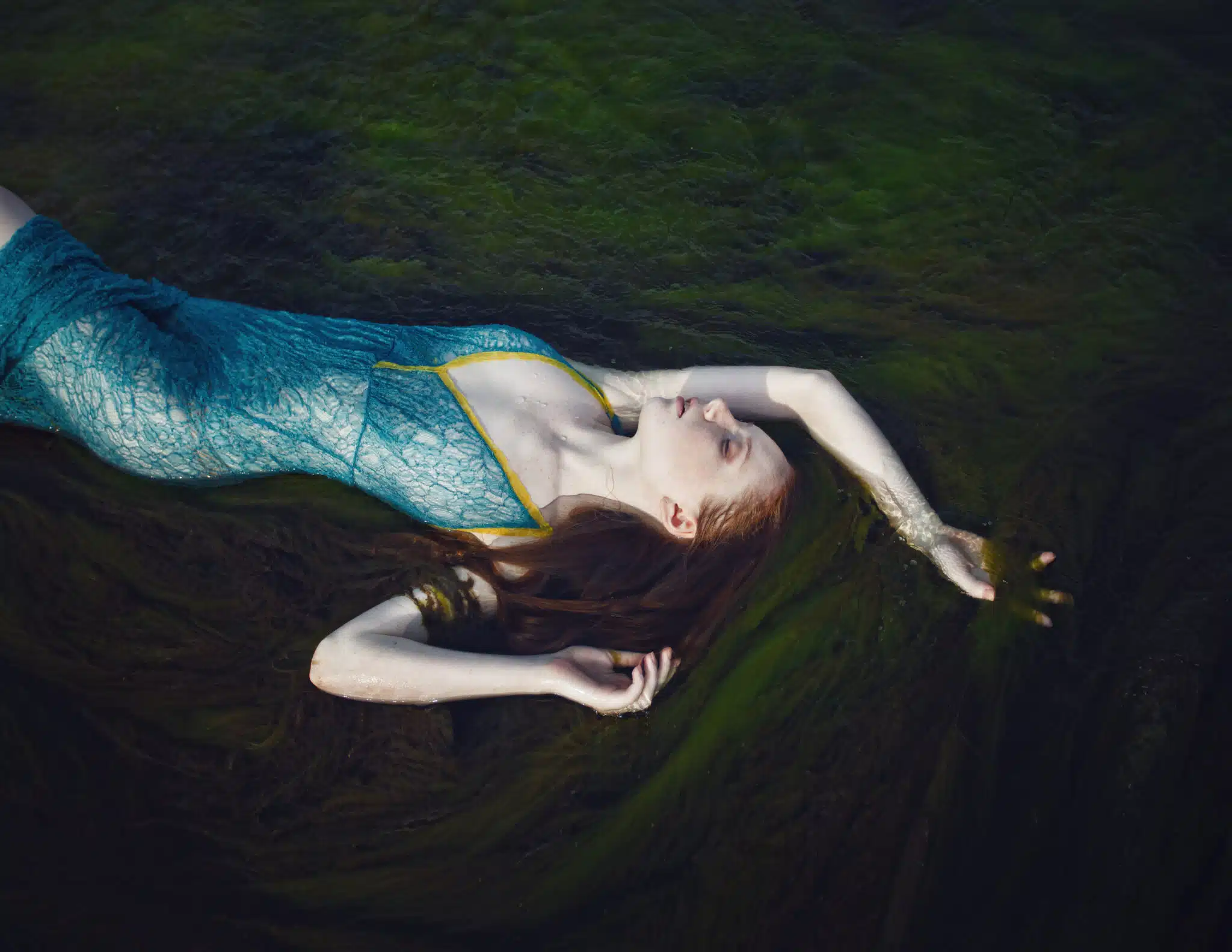
“The Fisher” by Johann Wolfgang von Goethe (Charles Timothy Brooks, Translator)
The waters purled, the waters swelled,—
A fisher sat near by,
And earnestly his line beheld
With tranquil heart and eye;
And while he sits and watches there,
He sees the waves divide,
And, lo! a maid, with glistening hair,
Springs from the troubled tide.
She sang to him, she spake to him,—
“Why lur’st thou from below,
In cruel mood, my tender brood,
To die in day’s fierce glow?
Ah! didst thou know how sweetly there
The little fishes dwell,
Thou wouldst come down their lot to share,
And be forever well.
“Bathes not the smiling sun at night—
The moon too—in the waves?
Comes he not forth more fresh and bright
From ocean’s cooling caves?
Canst thou unmoved that deep world see,
That heaven of tranquil blue,
Where thine own face is beckoning thee
Down to the eternal dew?”
The waters purled, the waters swelled,—
They kissed his naked feet;
His heart a nameless transport held,
As if his love did greet.
She spake to him, she sang to him;
Then all with him was o’er,—
Half drew she him, half sank he in,—
He sank to rise no more.
“Oberon’s Feast” by Robert Herrick
SHAPCOT! to thee the fairy state
I, with discretion, dedicate.
Because thou prizest things that are
Curious and unfamiliar.
Take first the feast ; these dishes gone,
We’ll see the fairy court anon.
A little mushroom table spread,
After short prayers, they set on bread ;
A moon-parch’d grain of purest wheat,
With some small glittering grit to eat
His choice bits with ; then in a trice
They make a feast less great than nice.
But all this while his eye is serv’d,
We must not think his ear was sterv’d ;
But that there was in place to stir
His spleen, the chirring grasshopper,
The merry cricket, puling fly,
The piping gnat for minstrelsy.
And now we must imagine, first,
The elves present, to quench his thirst,
A pure seed-pearl of infant dew
Brought and besweetened in a blue
And pregnant violet ; which done,
His kitling eyes begin to run
Quite through the table, where he spies
The horns of papery butterflies :
Of which he eats, and tastes a little
Of that we call the cuckoo’s spittle.
A little fuzz-ball pudding stands
By, yet not blessed by his hands,
That was too coarse ; but then forthwith
He ventures boldly on the pith
Of sugar’d rush, and eats the sagg
And well-bestrutted bee’s sweet bag :
Gladdening his pallet with some store
Of emmets’ eggs ; what would he more ?
But beards of mice, a newt’s stewed thigh,
A bloated earwig and a fly ;
With the red-capp’d worm that’s shut
Within the concave of a nut,
Brown as his tooth. A little moth
Late fatten’d in a piece of cloth :
With withered cherries, mandrakes’ ears,
Moles’ eyes ; to these the slain stag’s tears,
The unctuous dewlaps of a snail,
The broke-heart of a nightingale
O’ercome in music ; with a wine
Ne’er ravish’d from the flattering vine,
But gently press’d from the soft side
Of the most sweet and dainty bride,
Brought in a dainty daisy, which
He fully quaffs up to bewitch
His blood to height ; this done, commended
Grace by his priest ; the feast is ended.
“The Fairy Child” by John Anster
The summer sun was sinking
With a mild light, calm and mellow;
It shone on my little boy’s bonnie cheeks,
And his loose locks of yellow.
The robin was singing sweetly,
And his song was sad and tender;
And my little boy’s eyes, while he heard the song,
Smiled with a sweet, soft splendor.
My little boy lay on my bosom
While his soul the song was quaffing;
The joy of his soul had tinged his cheek,
And his heart and his eye were laughing.
I sate alone in my cottage,
The midnight needle plying;
I feared for my child, for the rush’s light
In the socket now was dying;
There came a hand to my lonely latch,
Like the wind at midnight moaning;
I knelt to pray, but rose again,
For I heard my little boy groaning.
I crossed my brow and I crossed my breast,
But that night my child departed,—
They left a weakling in his stead,
And I am broken-hearted!
O, it cannot be my own sweet boy,
For his eyes are dim and hollow;
My little boy is gone—is gone,
And his mother soon will follow.
The dirge for the dead will be sung for me,
And the mass be chanted meetly,
And I shall sleep with my little boy,
In the moonlight churchyard sweetly.
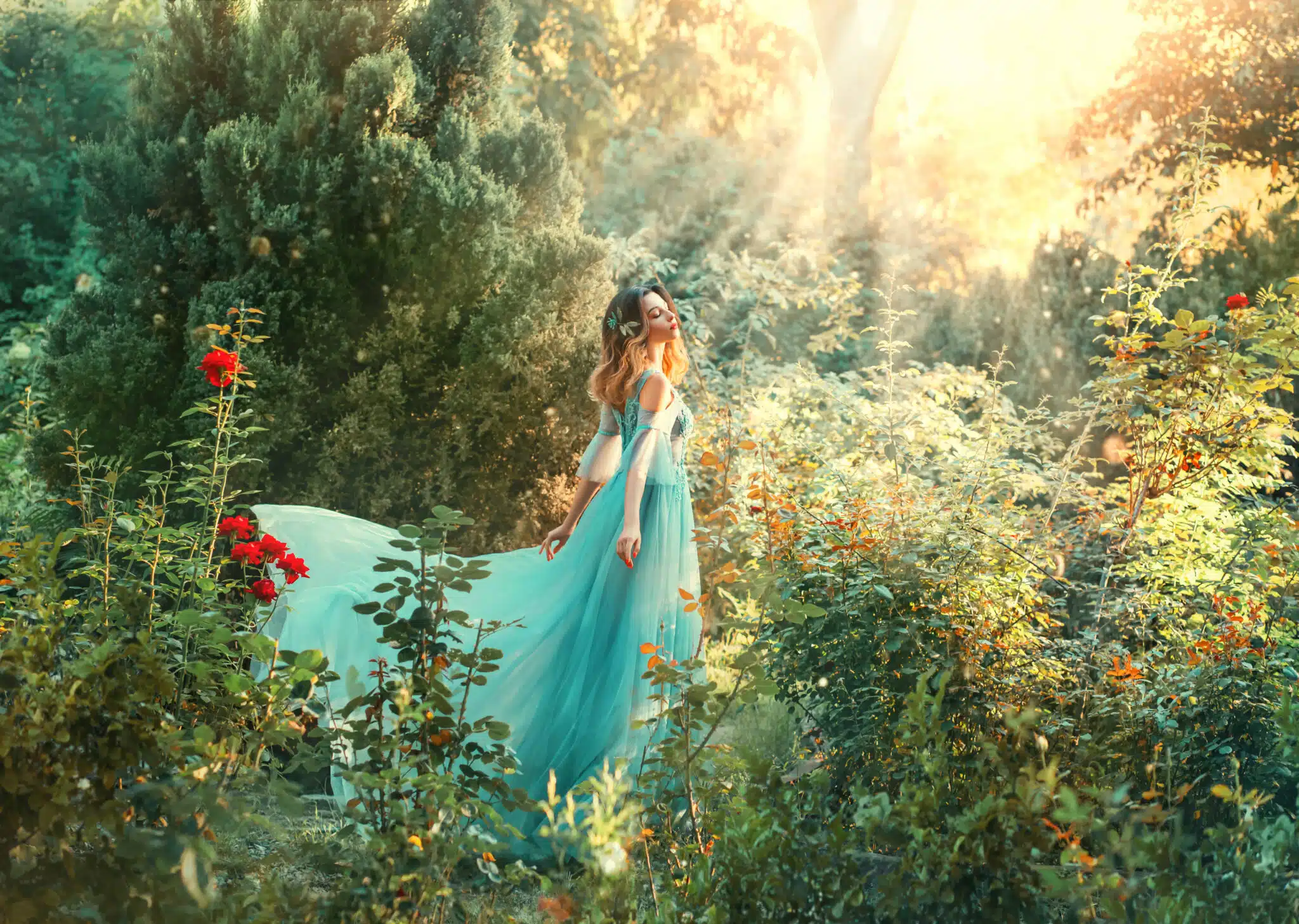
“A Rose, as Fair as Ever Saw the North” by William Browne
A rose, as fair as ever saw the North
Grew in a little garden all alone;
A sweeter flower did Nature ne’er put forth,
Nor fairer garden yet was never known:
The maidens danced about it morn and noon,
And learned bards of it their ditties made;
The nimble fairies by the pale-faced moon
Water’d the root and kiss’d her pretty shade.
But well-a-day!—the gardener careless grew;
The maids and fairies both were kept away,
And in a drought the caterpillars threw
Themselves upon the bud and every spray.
God shield the stock! If heaven send no supplies,
The fairest blossom of the garden dies.
“Elfin” by Madison Julius Cawein
I
When wildflower blue and wildflower white
The wildflowers lay their heads together,
And the moon-moth glimmers along the night,
And the wandering firefly flares its light,
And the full moon rises broad and bright,
Then, then it is elfin weather.
II
And fern and flower on top of the hill
Are a fairy wood where the fairies camp ;
And there, to the pipe of the cricket shrill,
And the owl’s bassoon or the whippoorwill,
They whirl their wildest and trip their fill
By the light of the glow-worm’s lamp.
III
And the mottled toad and the katydid
Are the henchmen set to guard their dance;
At whose cry they creep ‘ neath the dewy lid
Of a violet’s eye, or close lie hid
In a bluebell’s ear, if a mortal ‘ mid
The moonlit woods should chance.
IV
And the forest-fly with its gossamer wings,
And filmy body of rainbow dye,
Is the ouphen steed each elfin brings,
Whereon by the light of the stars he swings,
When the dance is done and the barn-cock sings,
And the dim dawn streaks the sky.
“Fairies’ Song” by Thomas Randolph (Leigh Hunt, Translator)
We the fairies blithe and antic,
Of dimensions not gigantic,
Though the moonshine mostly keep us,
Oft in orchards frisk and peep us.
Stolen sweets are always sweeter;
Stolen kisses much completer;
Stolen looks are nice in chapels;
Stolen, stolen be your apples.
When to bed the world are bobbing,
Then ’s the time for orchard-robbing;
Yet the fruit were scarce worth peeling
Were it not for stealing, stealing.
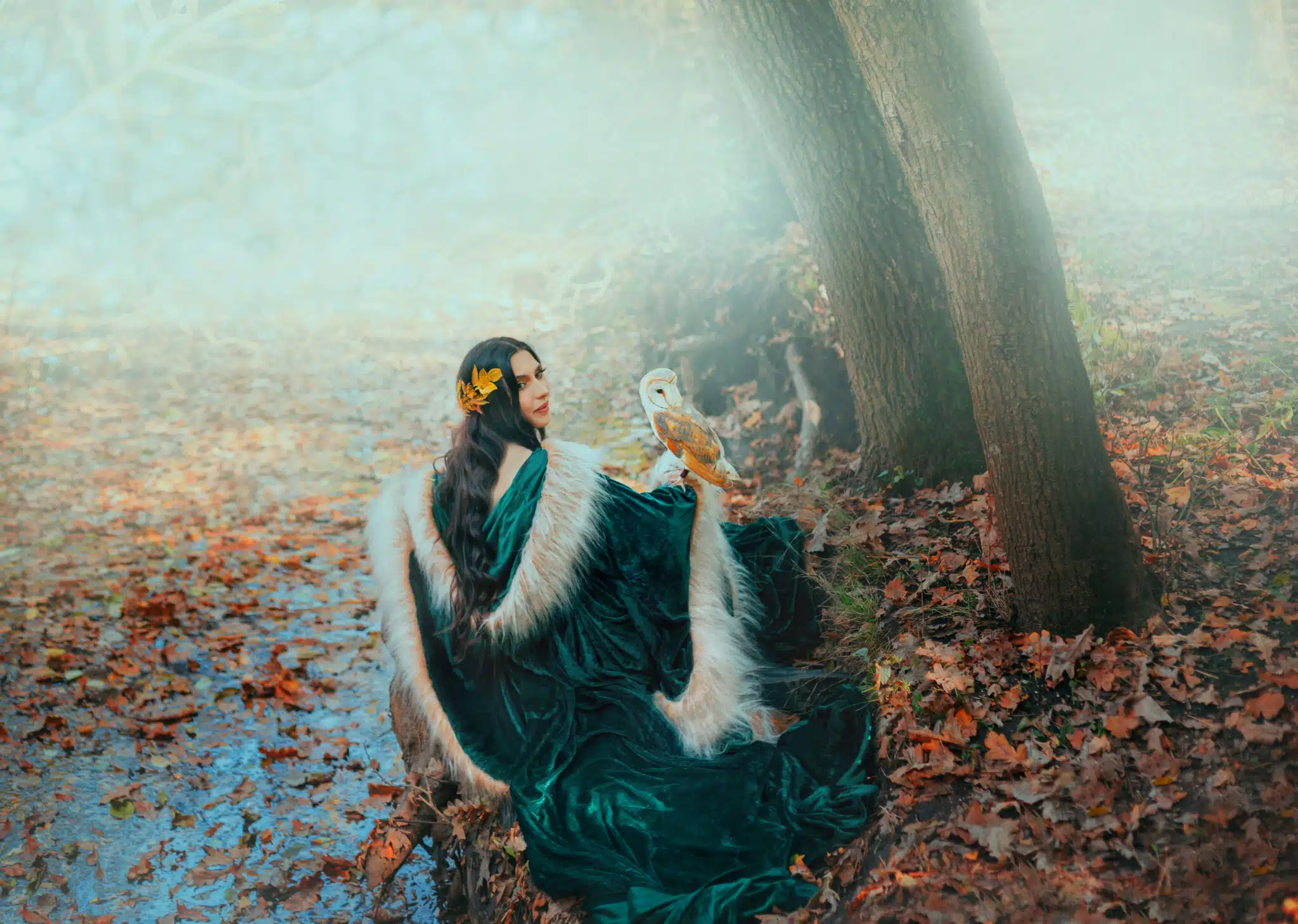
“Mor of Cloyne” by Alfred Perceval Graves
Little Sister, whom the Fay
Hides away within his doon,
Deep below yon seeding fern,
Oh, list and learn my magic tune.
Long ago, when snared like thee
By the Shee, my harp and I
O’er them wove the slumber spell,
Warbling well its lullaby.
Till with dreamy smiles they sank,
Rank on rank, before the strain;
And I rose from out the rath,
And found my path to earth again.
Little Sister, to my woe
Hid below among the Shee,
List and learn the magic tune,
That it full soon may succour thee.
“The Stolen Child” by William Butler Yeats
Where dips the rocky highland
Of Sleuth Wood in the lake,
There lies a leafy island
Where flapping herons wake
The drowsy water-rats;
There we’ve hid our faery vats,
Full of berries
And of reddest stolen cherries.
Come away, O human child!
To the waters and the wild
With a faery, hand in hand,
For the world’s more full of weeping than you can understand.
Where the wave of moonlight glosses
The dim grey sands with light,
Far off by furthest Rosses
We foot it all the night,
Weaving olden dances,
Mingling hands and mingling glances
Till the moon has taken flight;
To and fro we leap
And chase the frothy bubbles,
While the world is full of troubles
And is anxious in its sleep.
Come away, O human child!
To the waters and the wild
With a faery, hand in hand,
For the world’s morefully of weeping than you can understand.
Where the wandering water gushes
From the hills above Glen-Car,.
In pools among the rushes
That scarce could bathe a star,
We seek for slumbering trout
And whispering in their ears
Give them unquiet dreams;
Leaning softly out
From ferns that drop their tears
Over the young streams.
Come away, O human child!
To the waters and the wild
With a faery, hand in hand,
For to world’s morefully of weeping than you can understand.
Away with us he’s going,
The solemn-eyed:
He’ll hear no more the lowing
Of the calves on the warm hillside
Or the kettle on the hob
Sing peace into his breast,
Or see the brown mice bob
Round and round the oatmeal-chest.
For he comes, the human child,
To the waters and the wild
With a faery, hand in hand,
from a world more full of weeping than you can understand.
“The Changeling” by James Russell Lowell
I had a little daughter,
And she was given to me
To lead me gently backward
To the Heavenly Father’s knee,
That I, by the force of nature,
Might in some dim wise divine
The depth of his infinite patience
To this wayward soul of mine.
I know not how others saw her,
But to me she was wholly fair,
And the light of the heaven she came from
Still lingered and gleamed in her hair;
For it was as wavy and golden,
And as many changes took,
As the shadows of sun-gilt ripples
On the yellow bed of a brook.
To what can I liken her smiling
Upon me, her kneeling lover,
How it leaped from her lips to her eyelids,
And dimpled her wholly over,
Till her outstretched hands smiled also,
And I almost seemed to see
The very heart of her mother
Sending sun through her veins to me!
She had been with us scarce a twelvemonth,
And it hardly seemed a day,
When a troop of wandering angels
Stole my little daughter away;
Or perhaps those heavenly Zingari
But loosed the hampering strings,
And when they had opened her cage-door
My little bird used her wings.
But they left in her stead a changeling,
A little angel child,
That seems like her bud in full blossom,
And smiles as she never smiled:
When I wake in the morning, I see it
Where she always used to lie,
And I feel as weak as a violet
Alone ‘neath the awful sky.
As weak, yet as trustful also;
For the whole year long I see
All the wonders of faithful Nature
Still worked for the love of me;
Winds wander, and dews drip earthward,
Rain falls, suns rise and set,
Earth whirls, and all but to prosper
A poor little violet.
This child is not mine as the first was,
I cannot sing it to rest,
I cannot lift it up fatherly
And bliss it upon my breast;
Yet it lies in my little one’s cradle
And sits in my little one’s chair,
And the light of the heaven she’s gone to
Transfigures its golden hair.
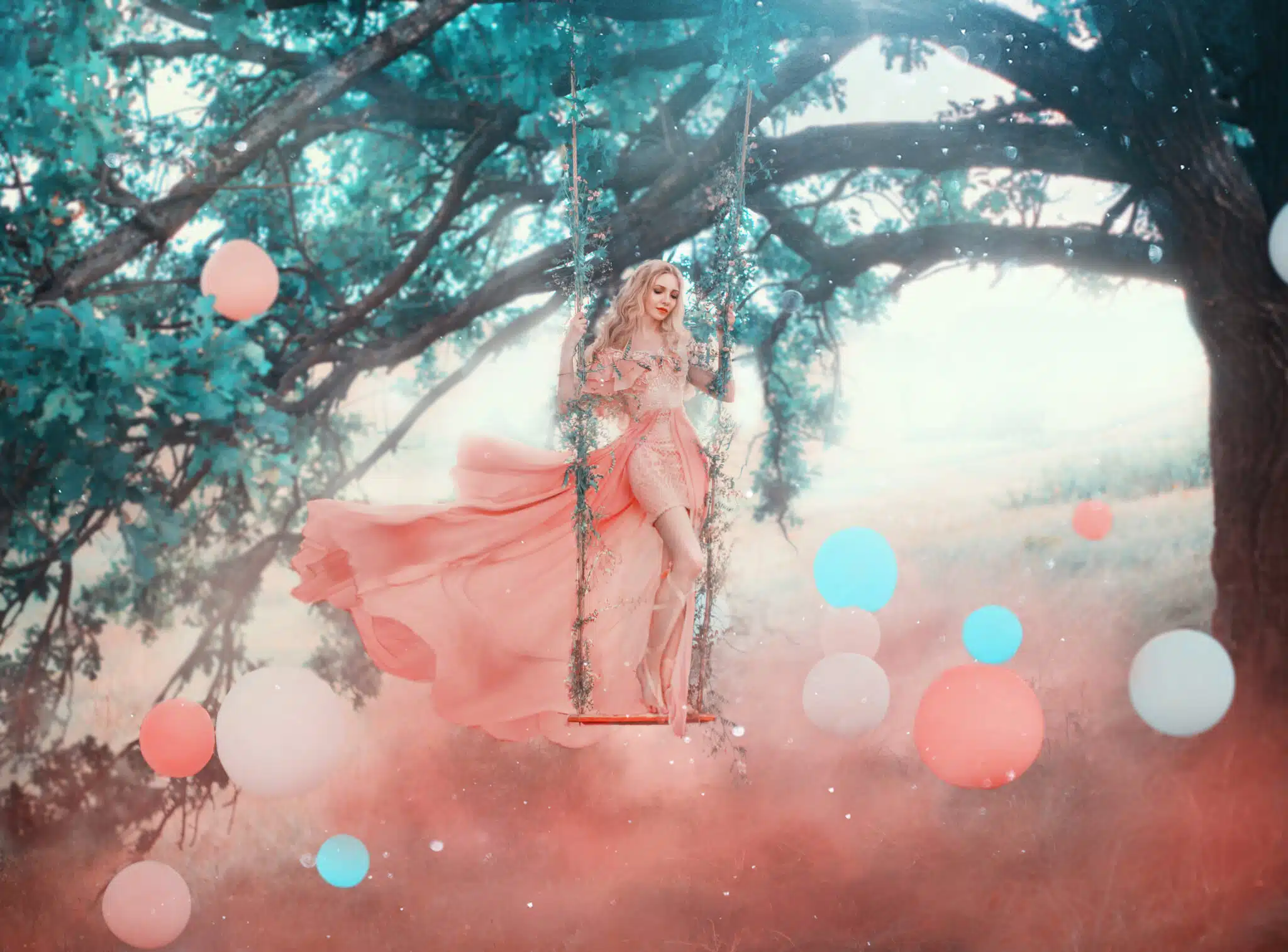
“The Mocking Fairy” by Walter De la Mare
“Won’t you look out of your window, Mrs. Gill?”
Quoth the Fairy, nidding, nodding in the garden;
”Can’t you look out of your window, Mrs. Gill?”
Quoth the Fairy, laughing softly in the garden;
But the air was still, the cherry boughs were still,
And the ivy-tod ‘neath the empty sill,
And never from her window looked out Mrs. Gill
On the Fairy shrilly mocking in the garden.
“What have they done with you, you poor Mrs. Gill?”
Quoth the Fairy, brightly glancing in the garden;
“Where have they hidden you, you poor old Mrs. Gill?”
Quoth the Fairy dancing lightly in the garden;
But night’s faint veil now wrapped the hill,
Stark ‘neath the stars stood the dead-still Mill,
And out of her cold cottage never answered Mrs. Gill
The Fairy mimbling mambling in the garden.
“The Lady Lost in the Wood” by John Milton
THE LADY.—This way the noise was, if mine ear be true,
My best guide now; methought it was the sound
Of riot and ill-managed merriment,
Such as the jocund flute or gamesome pipe
Stirs up amongst the loose, unlettered hinds,
When for their teeming flocks and granges full
In wanton dance they praise the bounteous Pan,
And thank the gods amiss. I should be loath
To meet the rudeness and swilled insolence
Of such late wassailers; yet O, where else
Shall I inform my unacquainted feet
In the blind mazes of this tangled wood?
My brothers, when they saw me wearied out
With this long way, resolving here to lodge
Under the spreading favor of these pines,
Stepped, as they said, to the next thicket side
To bring me berries, or such cooling fruit
As the kind, hospitable woods provide.
They left me then, when the gray-hooded even,
Like a sad votarist in palmer’s weed,
Rose from the hindmost wheels of Phœbus’ wain.
But where they are, and why they came not back,
Is now the labor of my thoughts: ’t is likeliest
They had engaged their wandering steps too far,
And envious darkness, ere they could return,
Had stole them from me; else, O thievish night,
Why shouldst thou, but for some felonious end,
In thy dark lantern thus close up the stars,
That nature hung in heaven, and filled their lamps
With everlasting oil, to give due light
To the misled and lonely traveller?
This is the place, as well as I may guess,
Whence even now the tumult of loud mirth
Was rife, and perfect in my listening ear,
Yet naught but single darkness do I find.
What might this be? A thousand fantasies
Begin to throng into my memory,
Of calling shapes, and beckoning shadows dire,
And airy tongues, that syllable men’s names
On sands and shores and desert wildernesses.
These thoughts may startle well, but not astound
The virtuous mind, that ever walks attended
By a strong-siding champion, Conscience.
O welcome, pure-eyed Faith, white-handed Hope,
Thou hovering angel girt with golden wings,
And thou unblemished form of Chastity;
I see you visibly, and now believe
That he, the Supreme Good, to whom all things ill
Are but as slavish officers of vengeance,
Would send a glistering guardian, if need were,
To keep my life and honor unassailed.
Was I deceived, or did a sable cloud
Turn forth her silver lining on the night?
I did not err, there does a sable cloud
Turn forth her silver lining on the night,
And casts a gleam over this tufted grove.
I cannot halloo to my brothers; but
Such noise as I can make, to be heard farthest,
I ’ll venture, for my new-enlivened spirits
Prompt me; and they perhaps are not far off.
“Dream-Song” by Walter De la Mare
Sunlight, moonlight,
Twilight, starlight
Gloaming at the close of day,
And an owl calling,
Cool dews falling
In a wood of oak and may.
Lantern-light, taper-light,
Torchlight, no-light:
Darkness at the shut of day,
And lions roaring,
Their wrath pouring
In wild waste places far away.
Elf-light, bat-light,
Touch wood- light and toad-light,
And the sea a shimmering gloom of grey,
And a small face smiling
In a dream’s beguiling
In a world of wonders far away.
Fairy Poems by Shakespeare
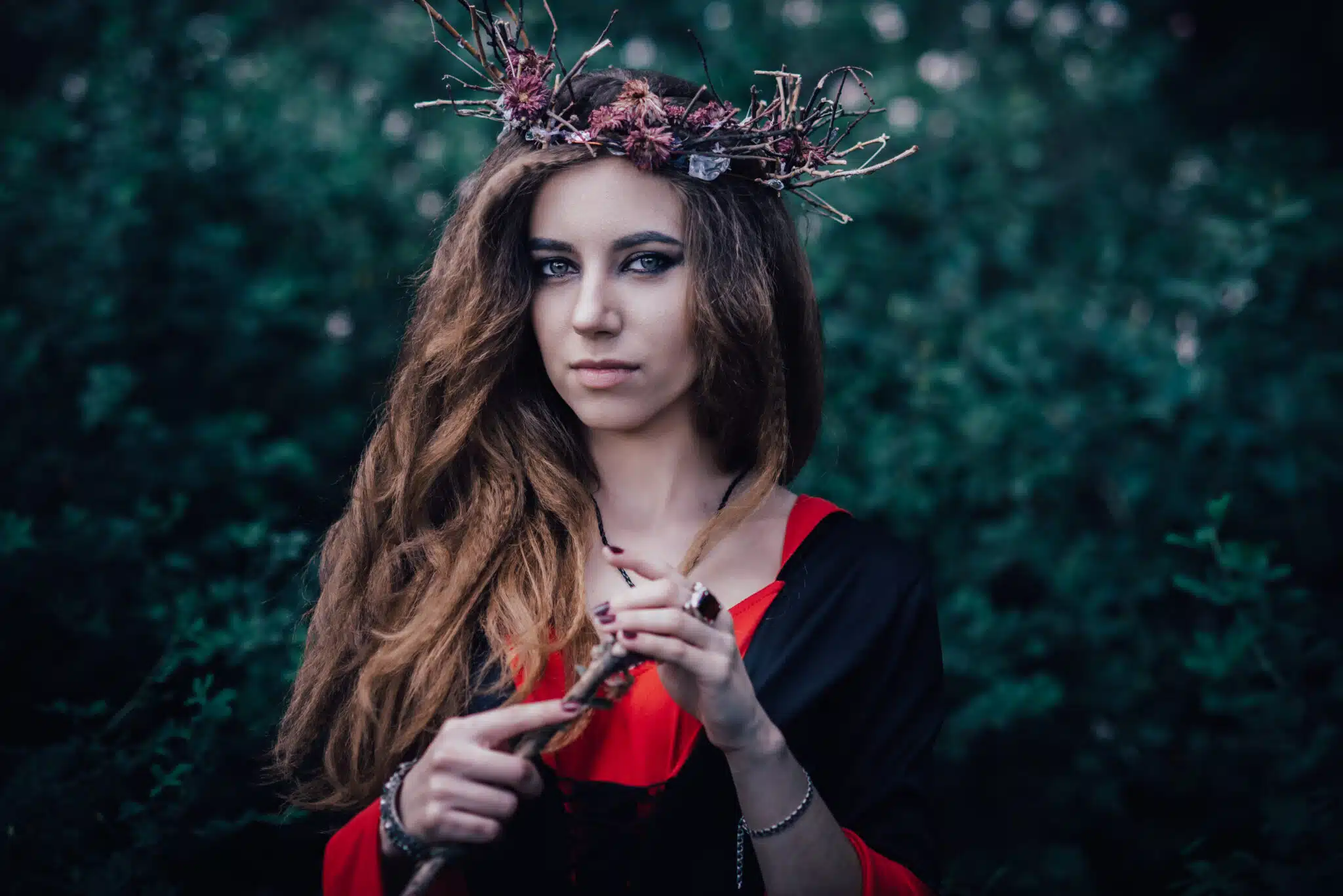
“Fairy’s Song” by William Shakespeare
Over hill, over dale,
Thorough bush, thorough brier,
Over park, over pale,
Thorough flood, thorough fire,
I do wander everywhere,
Swifter than the moon’s sphere;
And I serve the fairy queen,
To dew her orbs upon the green;
The cowslips tall her pensioners be;
In their gold coats, spots you see;
These be rubies, fairy favors—
In those freckles live their savors.
I must go seek some dewdrops here,
And hang a pearl in every cowslip’s ear.
“Queen Mab” by William Shakespeare
O, then, I see, Queen Mab hath been with you.
She is the fairies’ midwife; and she comes
In shape no bigger than an agate-stone
On the fore-finger of an alderman,
Drawn with a team of little atomies
Athwart men’s noses as they lie asleep:
Her wagon-spokes made of long spinners’ legs;
The cover, of the wings of grasshoppers;
The traces, of the smallest spider’s web;
The collars, of the moonshine’s watery beams;
Her whip, of cricket’s bone; the lash, of film;
Her wagoner, a small gray-coated gnat,
Not half so big as a round little worm
Pricked from the lazy finger of a maid:
Her chariot is an empty hazel-nut,
Made by the joiner squirrel, or old grub,
Time out of mind the fairies’ coach-makers.
And in this state she gallops night by night
Through lovers’ brains, and then they dream of love;
On courtiers’ knees, that dream on court’sies straight;
O’er lawyers’ fingers, who straight dream on fees;
O’er ladies’ lips, who straight on kisses dream,—
Which oft the angry Mab with blisters plagues,
Because their breaths with sweetmeats tainted are:
Sometime she gallops o’er a courtier’s nose,
And then dreams he of smelling out a suit;
And sometime comes she with a tithe-pig’s tail,
Tickling a parson’s nose as ’a lies asleep,
Then dreams he of another benefice:
Sometime she driveth o’er a soldier’s neck,
And then dreams he of cutting foreign throats,
Of breaches, ambuscadoes, Spanish blades,
Of healths five fathom deep; and then anon
Drums in his ear, at which he starts, and wakes;
And, being thus frighted, swears a prayer or two,
And sleeps again. This is that very Mab
That plats the manes of horses in the night;
And bakes the elf-locks in foul sluttish hairs,
Which, once untangled, much misfortune bodes:
This is the hag, when maids lie on their backs,
That presses them, and learns them first to bear,
Making them women of good carriage.
“Compliment to Queen Elizabeth” by William Shakespeare
OBERON.—My gentle Puck, come hither. Thou remember’st
Since once I sat upon a promontory,
And heard a mermaid, on a dolphin’s back,
Uttering such dulcet and harmonious breath,
That the rude sea grew civil at her song,
And certain stars shot madly from their spheres,
To hear the sea-maid’s music.
PUCK.—I remember.
OBERON.—That very time I saw (but thou couldst not),
Flying between the cold moon and the earth,
Cupid all armed: a certain aim he took
At a fair vestal thronèd by the west,
And loosed his love-shaft smartly from his bow,
As it should pierce a hundred thousand hearts:
But I might see young Cupid’s fiery shaft
Quenched in the chaste beams of the watery moon,
And the imperial votaress passed on,
In maiden meditation, fancy free.
Yet marked I where the bolt of Cupid fell:
It fell upon a little western flower
Before milk-white, now purple with love’s wound,
And maidens call it Love-in-idleness.
Fetch me that flower.
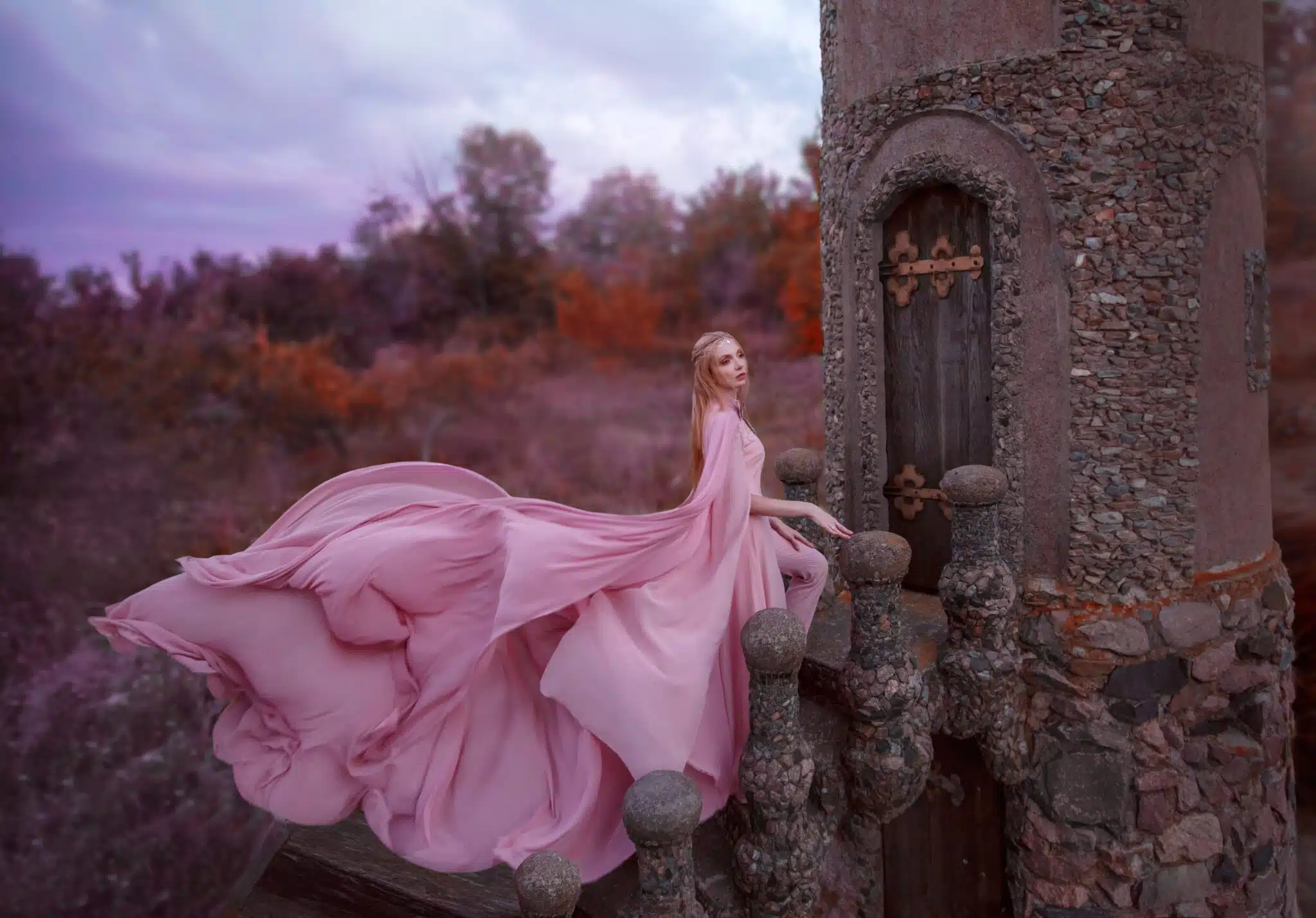
“The Fairies’ Lullaby” by William Shakespeare
TITANIA.—Come, now a roundel, and a fairy song;
Then, for the third part of a minute, hence;—
Some, to kill cankers in the musk-rose buds;
Some war with rear-mice for their leathern wings,
To make my small elves coats; and some keep back
The clamorous owl, that nightly hoots, and wonders
At our quaint spirits. Sing me now asleep;
Then to your offices, and let me rest.
SONG.
1 FAIRY.—You spotted snakes, with double tongue,
Thorny hedgehogs, be not seen;
Newts and blind-worms, do no wrong:
Come not near our fairy queen.
CHORUS.Philomel, with melody,
Sing in our sweet lullaby;
Lulla, lulla, lullaby; lulla, lulla, lullaby:
Never harm,
Nor spell nor charm,
Come our lovely lady nigh;
So, good-night, with lullaby.
2 FAIRY.—Weaving spiders, come not here,
Hence, you long-legged spinners, hence!
Beetles black, approach not near;
Worm, nor snail, do no offence.
CHORUS.Philomel, with melody, etc.
1 FAIRY.—Hence away; now all is well:
One, aloof, stand sentinel.
“Airy Nothings” by William Shakespeare
Our revels now are ended. These our actors,
As I foretold you, were all spirits, and
Are melted into air, into thin air;
And, like the baseless fabric of this vision,
The cloud-capped towers, the gorgeous palaces,
The solemn temples, the great globe itself,
Yea, all which it inherit, shall dissolve,
And, like this insubstantial pageant faded,
Leave not a rack behind. We are such stuff
As dreams are made on; and our little life
Is rounded with a sleep.
“Songs of Ariel” by William Shakespeare
I.
Come unto these yellow sands,
And then take hands;
Court’sied when you have, and kissed.
(The wild waves whist!)
Foot it featly here and there;
And, sweet sprites, the burthen bear.
Hark, hark!
Burthen [dispersedly]—Bow-wow.
The watch-dogs bark—
Burthen [dispersedly]—Bow-wow.
Hark, hark! I hear
The strain of strutting chanticleer
Cry Cock-a diddle-dow.
II.
Full fathom five thy father lies;
Of his bones are coral made;
Those are pearls that were his eyes;
Nothing of him that doth fade
But doth suffer a sea-change
Into something rich and strange.
Sea-nymphs hourly ring his knell:
Burthen.—Ding-dong!
Hark! now I hear them—ding, dong, bell!
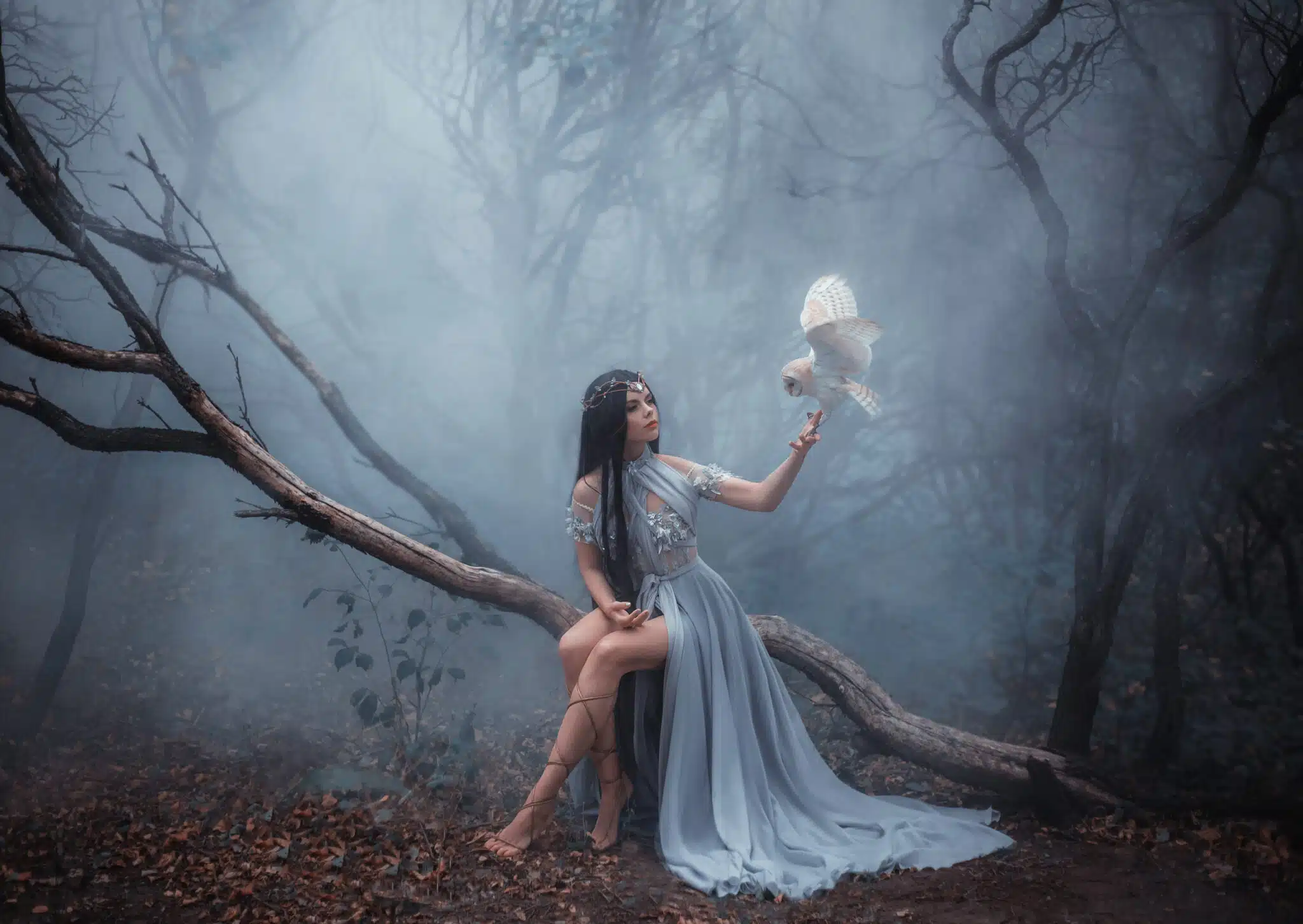
“Through the House Give Glimmering Light” by William Shakespeare
Through the house give glimmering light,
By the dead and drowsy fire;
Every elf and fairy sprite,
Hop as light as bird from brier;
And this ditty after me Sing, and dance it trippingly.
First rehearse your song by note,
In each word a warbling note;
Hand in hand with fairy grace
Will we sing and bless this place.
“Now the Hungry Lion Roars” by William Shakespeare
Now the hungry lion roars,
And the wolf behowls the moon ;
Whilst the heavy ploughman snores,
All with weary task foredone.
Now the wasted brands do glow,
Whilst the scritch owl, scritching
loud,
Puts the wretch that lies in woe,
In remembrance of a shroud.
Now it is the time of night
That the graves all gaping wide,
Every one lets forth his sprite,
In the churchway paths to glide :
And we fairies that do run,
By the triple Hecate’s Team,
From the presence of the sun,
Following darkness like a dream,
Now are frolic; not a mouse
Shall disturb this hallowed house :
I am sent with broom before,
To sweep the dust behind the door.
“A Fairy’s Song” by William Shakespeare
Where the bee sips, there lurk I;
In a cowslip’s bell I lie;
There I couch when owls do cry:
On the bat’s wing do I fly After sunset merrily.
Merrily, merrily, shall I live now,
Under the blossom that hangs on the bough.
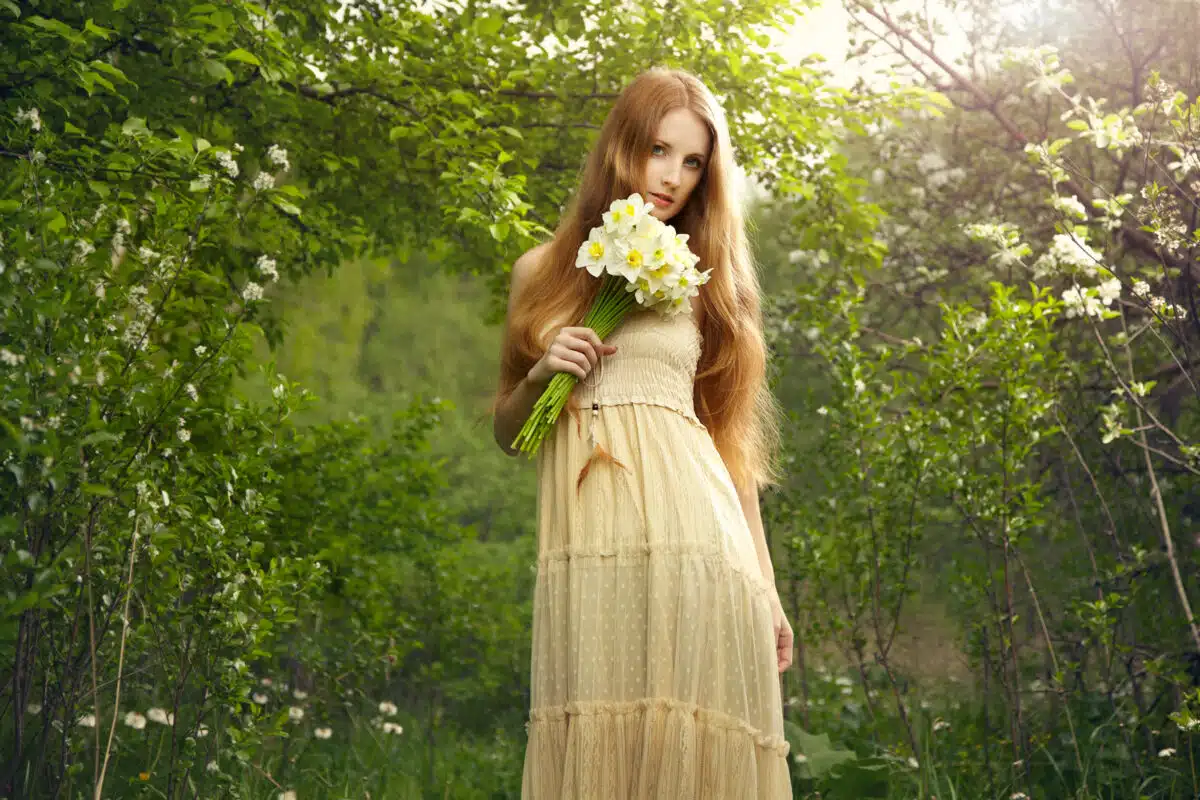
“A Fairy Song” by William Shakespeare
Come, follow, follow me,
Ye fairy elves that be,
Light tripping o’er the green,
Come follow Mab your queen;
Hand in hand we’ll dance around,
For this place is fairy ground.
When mortals are at rest,
And snoring in their nest,
Unheard and unespied,
Through the key-holes we do glide;
Over tables, stools and shelves,
We trip it with our fairy elves.
And if the house is swept,
And from uncleanness kept,
We praise the household maid,
And surely she is paid;
For every night, before we go,
We drop a sixpence in her shoe.
Then o’er a mushroom’s head
Our table-cloth we spread;
A grain of rye or wheat
The diet that we eat:
Pearly drops of dew we drink,
In acorn-cups filled to the brink.
The grasshopper, gnat and fly,
Serve for our minstrelsy;
Grace said, we dance awhile, ‘
And so the time beguile;
And if the moon doth hide her head,
The glow-worm lights us home to bed.
O’er tops of dewy grass
So nimbly do we pass,
The young and tender stalk
Ne’er bends where we do walk’;
Yet in the morning may be seen
Where we the night before have been.
“The Fairy Queen Sleeping” by William Shakespeare
On yonder bank, where fragrant wild thyme blows,
Where ox-lips and the nodding violet grows,
Quite over-canopied with lush woodbine,
With sweet musk-roses and with eglantine,
There sleeps Titania, sometime of the night,
Lulled in those flowers with dances and delight.
And there the snake rolls his enamelled skin,
Full wide enough to wrap a fairy in.
Those cowslips tall her pensioners be;
In their gold coats spots you see,
Those are rubies, fairy favours,
In these freckles live their savours.
Her small elves seek for dew-drops near,
And hang a pearl in every cowslip’s ear.
Poems About Fairies and Elves
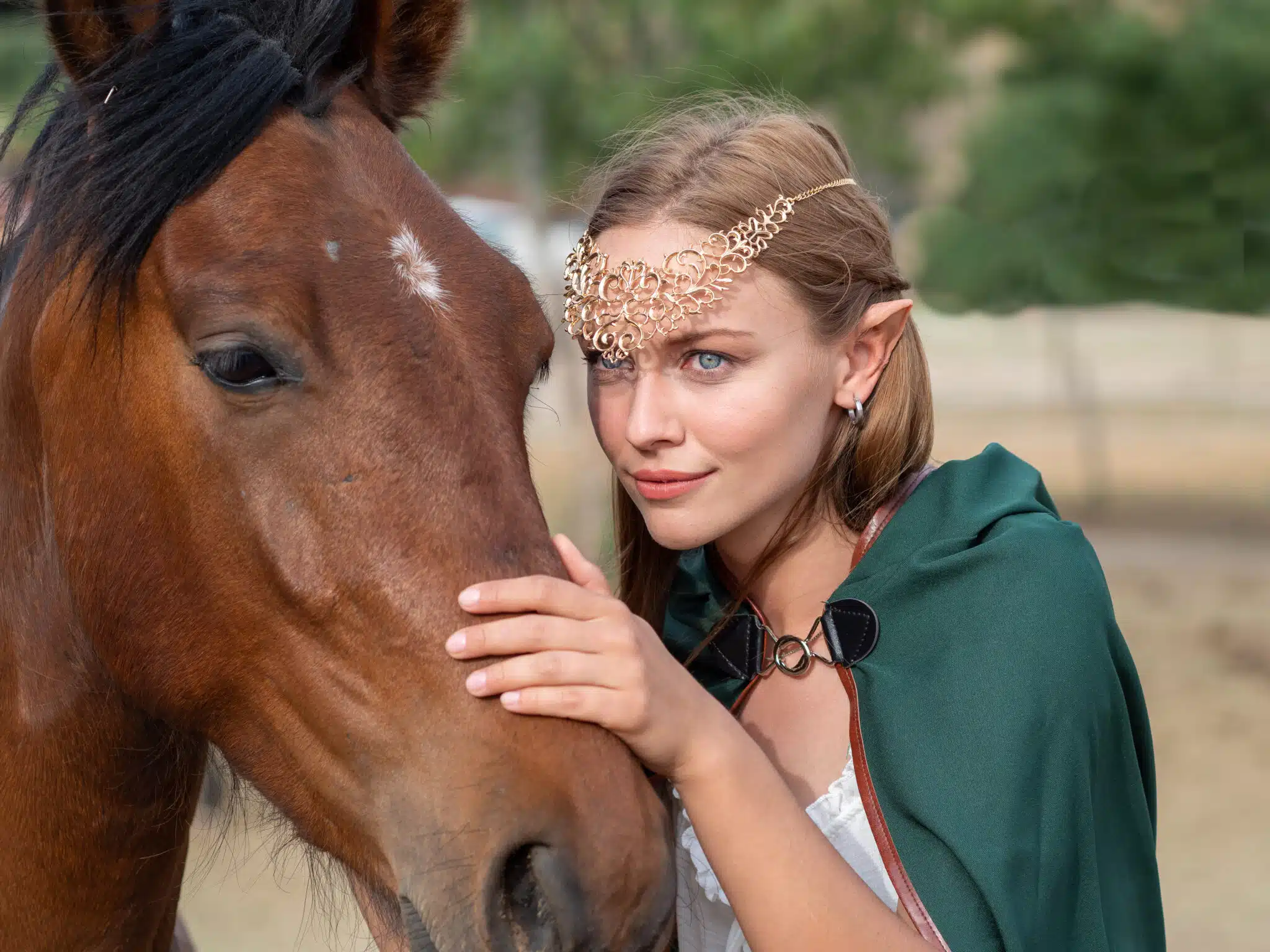
“Fairies’ Song” by James Henry Leigh Hunt (Thomas Randolph, Translator)
We the fairies blithe and antic
Of dimensions not gigantic,
Though the moonshine mostly keep us,
Oft in orchards frisk and peep us.
Stolen sweets are always sweeter;
Stolen kisses much completer;
Stolen looks are nice in chapels;
Stolen, stolen be your apples.
When to bed the world are bobbing,
Then’s the time for orchard robbing;
Yet the fruit were scarce worth peeling
Were it not for the stealing, stealing.
“The Fairy Queen’s Song” by William Schwenck Gilbert
Oh, foolish fay,
Think you because
Man’s brave array
My bosom thaws
I’d disobey
Our fairy laws?
Because I fly
In realms above,
In tendency
To fall in love
Resemble I
The amorous dove?
Oh, amorous dove!
Type of Ovidius Naso!
This heart of mine
Is soft as thine,
Although I dare not say so!
On fire that glows
With heat intense
I turn the hose
Of Common Sense,
And out it goes
At small expense!
We must maintain
Our fairy law;
That is the main
On which to draw –
In that we gain
A Captain Shaw.
Oh, Captain Shaw!
Type of true love kept under!
Could thy Brigade
With cold cascade
Quench my great love, I wonder!
“The Fairy’s Search” by Emeline Sherman Smith
‘Twas such an ove as Fairies love
All cloudless smiled the heaven above,
And gentle zephyrs wandered by
With the witching tone of a lover’s sigh ,
Or paused awhile, in their wayward flight,
To kiss some flower of brightest bloom ,
Which received the caress in mute delight,
Then paid it back in a breath of perfume.
The minstrel night-bird’s plaintive song
So sweetly broke o’er dewy plains
That echo kept the music long,
Then sent it forth in softer strains ;
So calm the sleeping waters lay,
So true they mirror’d back the glow
Of sky and moon and starry ray,
There seem’d another heaven below,
As pure, as fair , as full of love
As the blue boundless heaven above.
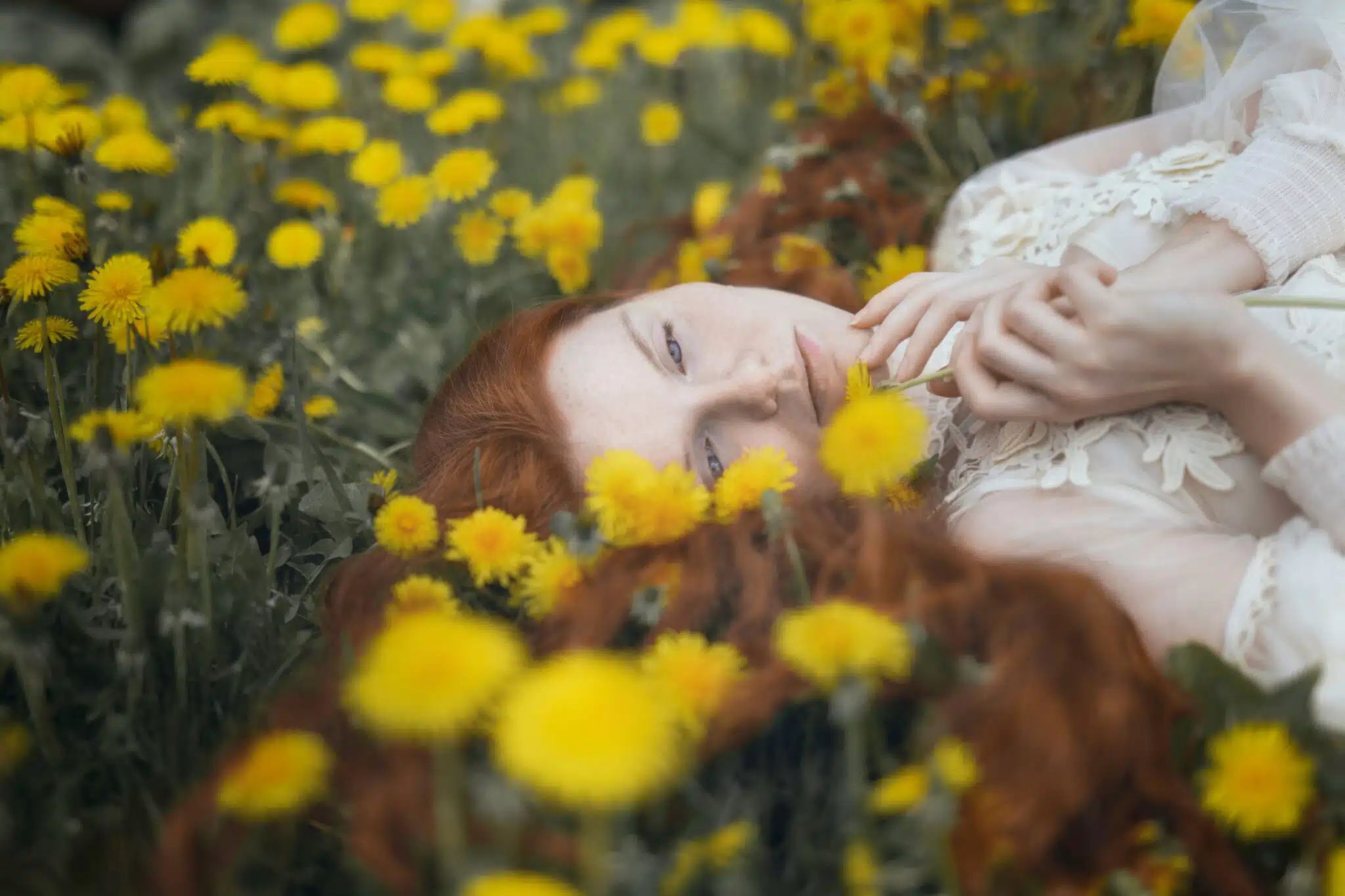
“The Fairy Woman’s Song” by Jean Ingelow
The fairy woman maketh moan,
“Well-a-day, and well-a-day,
Forsooth I brought thee one rose, one,
And thou didst cast my rose away.”
Hark! Oh hark, she mourneth yet,
“One good ship – the good ship sailed,
One bright star, at last it set,
One, one chance, forsooth it failed.”
Clear thy dusk hair from thy veiled eyes,
Show thy face as thee beseems,
For yet is starlight in the skies,
Weird woman piteous through my dreams.
“Nay,” she mourns, “forsooth not now,
Veiled I sit for evermore,
Rose is shed, and charmë”d prow
Shall not touch the charmë”d shore.”
There thy sons that were to be,
Thy small gamesome children play;
There all loves that men foresee
Straight as wands enrich the way.
Dove-eyed, fair, with me they worm
Where enthroned I reign a queen,
In the lovely realms foregone,
In the lives that might have been.
“Slumber Fairies” by Katharine Lee Bates
Hush, my little one! Hush! Lie down.
Mamma will sing, —
Sing of a boy in a wee white gown,
Sing of a king with a golden crown,
A crown of curls on a sweet, small head,
And a throne as high as a trundle-bed.
Dear little king !
Hush, my baby ! a song I know
Softer than all, —
A song as soft as the falling snow,
And I will sing it so light and low,
Baby must listen and lie as still
As the snowflakes lie on the quiet hill,
Where they fall.
Does baby know, when the day grows late,
Chilly and dim,
The slumber fairies, who stand and wait
Out in the lane and beyond the gate,
Pass over the lawn and open the door
And steal across the nursery floor,
Looking for him ?
Such tiny fairies, with slippers white
Over their feet.
Their cloaks are gray as the early night,
But their caps are lit with a silver light,
As if a moonbeam were caught, perhaps,
And cut up small into fairy caps
Dainty and neat.
Up the side of the trundle-bed
Softly they go,
And over the pillow with gentle tread
They come to the golden baby-head.
Under his lashes he tries to peep,
But before he knows, he is fast asleep.
Isn’t it so?
For they bind the baby with fairy charms
Wondrous to tell.
They loose the clasp of the dimpled arms,
And smooth his forehead with soft, small palms,
And draw their cloaks o’er his drowsy ears,
Till a fairy music is all he hears,
Pleasing him well.
They shade his eyes with a little dream.
Where did it grow?
It grew by the side of the fairy stream,
Where baby wandereth now, I deem,
With the slumber-fairies to guide his feet.
Good-night, dear laddie! Your rest be sweet!
Mamma must go.
“Baby Hazel’s Voyage” by Katharine Lee Bates
King Nod, King Nod, the drowsy god, is
such an idle fellow,
He sleeps away the livelong day, while yet
the sun is yellow;
But when the sinking sun is red and robin’s
song is failing,
‘Tis time for him to rub his dim old eyes and
go a-sailing.
His moonshine boat is soon afloat; a glow-
worm serves for pilot ;
On silver oars they graze the shores of many
a starry islet;
In silver sails they catch the winds, and down
the cloudy billows
Full fast they ride before the tide to Baby
Hazel’s pillows.
“Ahoy, sweet maid! Now art afraid, with
Old King Nod for skipper,
To sail the deep and drink sweet sleep from
yonder golden dipper?
Aboard, aboard, my dainty lass! aboard my
silver vessel!
And thou shalt see, in dream-land tree, the
little dream-birds nestle. “
She bowed — ah me! — her rosy knee, and
kissed the old king’s scepter.
Unto his breast the child he pressed and down
the darkness swept her.
Oh, frail the skiff, the silver skiff! O Hazel
Eyes, take warning!
On Sunrise Reef ’twill come to grief. Good-
night, good-night — good-morning!
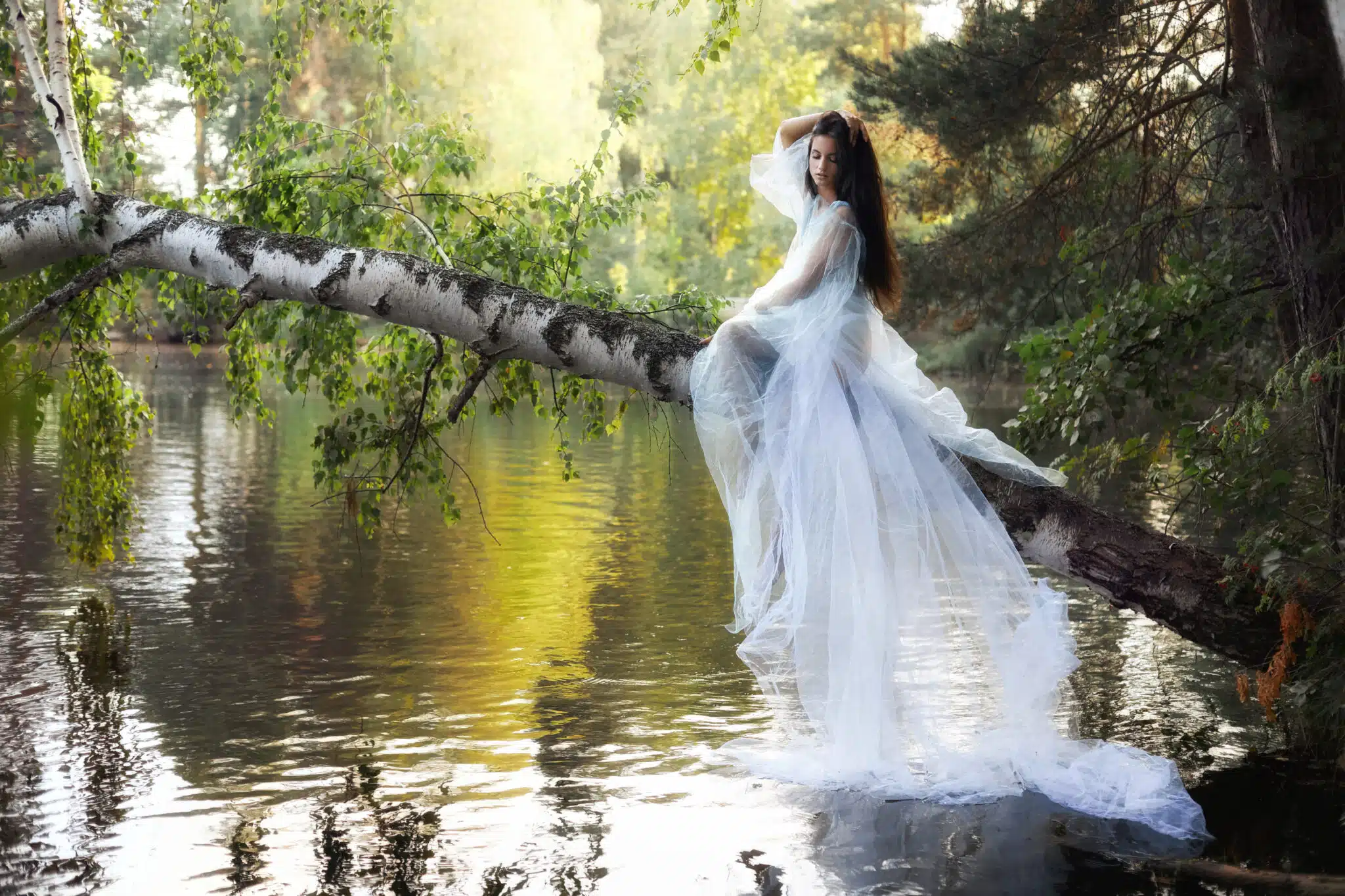
“Fairy’s Lullaby” by Katharine Lee Bates
In lily cup I’ll nest me,
From fairy dance to rest me,
For the silver moon
Dips low, and soon
Would the goblins swart molest me.
But never a gnome will mock me,
Nor peering toad-face shock me,
While the wind-elf blithe
Stands on tiptoe lithe
By the lily’s stem to rock me;
And the star-sprites lean above me,
For all the star-sprites love me ;
In circle fair
Each holds in air
His small gold torch above me.
Come, soft-winged Sleep, and kiss me,
For the dream-land fairies miss me,
Till thy sweet, cool lips
Part the folded tips
Of my lily-couch to kiss me.
But when thy spells unbind me
The sunbeams shall not find me,
And my dreamy nest
Be only guessed
By the fragrance left behind me.
“Fairy Rip van Winkle” by Katharine Lee Bates
His acorn cradle with fern and moss
Elf mamma had covered over,
And then had forgotten the path across
The blossoming field of clover.
For she was the wildest of all wee things,
And loved to dance in the moonlight
rings,
Or steal her a ride on butterfly wings, —
A genuine gypsy rover!
Streams flow,
Buds blow,
Stars peep out and twinkle.
Still deep
Thy sleep,
Fairy Rip van Winkle!
But he woke one day and with drowsy
eyes
Smiled into a dewy bubble
On his cradle edge; then in swift surprise
Cried out in a voice of trouble:
“O mamma, mamma, I don’t look right,
My cobweb nightie has grown so tight;
My buttercup curls are daisy white;
And over my eyebrows double
What’s this
Cross-criss
Funny little wrinkle?”
Long gazed,
Amazed,
Fairy Rip van Winkle.
For his nap in the acorn had lasted till
A new oak forest had sprouted,
And the elves had vanished from mead and rill,
By the schoolbook army routed.
And the ancient baby, whose eyes could see Never a toadstool spread for tea,
Nor lullaby-nurse of a honey-bee,
Put up his lip and pouted.
But no
Tiptoe
Lily bells went tinkle.
Bye-bye!
Don’t cry,
Fairy Rip van Winkle!
“The Little Knight in Green” by Katharine Lee Bates
What fragrant-footed comer
Is stepping o’er my head?
Behold my Queen, the Summer,
Who deems her warriors dead!
Now rise, ye knights of many fights,
From out your sleep profound!
Make sharp your spears, my gallant peers,
And prick the frozen ground!
Before the White Host harm her,
We’ll hurry to her aid.
We’ll don our elfin armor,
And every tiny blade
Shall bear atop a dewy drop,
The lifeblood of the Frost,
Till from their King the order ring :
“Fall back! the day is lost!”
Now shame to knighthood, brothers!
Must Summer plead in vain?
And shall I wait till others
My crown of sunshine gain?
Alone this day I’ll dare the fray,
Alone the victory win.
In me my Queen shall find, I ween,
A sturdy paladin.
To battle, ho! King Winter
Hath rushed on me apace.
My fragile weapons splinter
Beneath his icy mace.
I stagger back. I yield — alack!
I fall. My senses pass.
Woe worth the chance for doughtiest lance
Of all the House of Grass!
Last hope my heart gives over.
But hark! a shout of cheer!
Don Daisy and Count Clover,
Sir Buttercup are here.
Behold! behold! with shield of gold
Prince Dandelion comes.
Lord Bumblebee beats valiantly
His rolling battle-drums.
My brothers quit their slumbers
And lead the van of war.
Before our swelling numbers
The foes are driven far.
The day’s our own; but overthrown,
A little knight in green,
I kiss her feet and deem it sweet
To perish for my Queen.
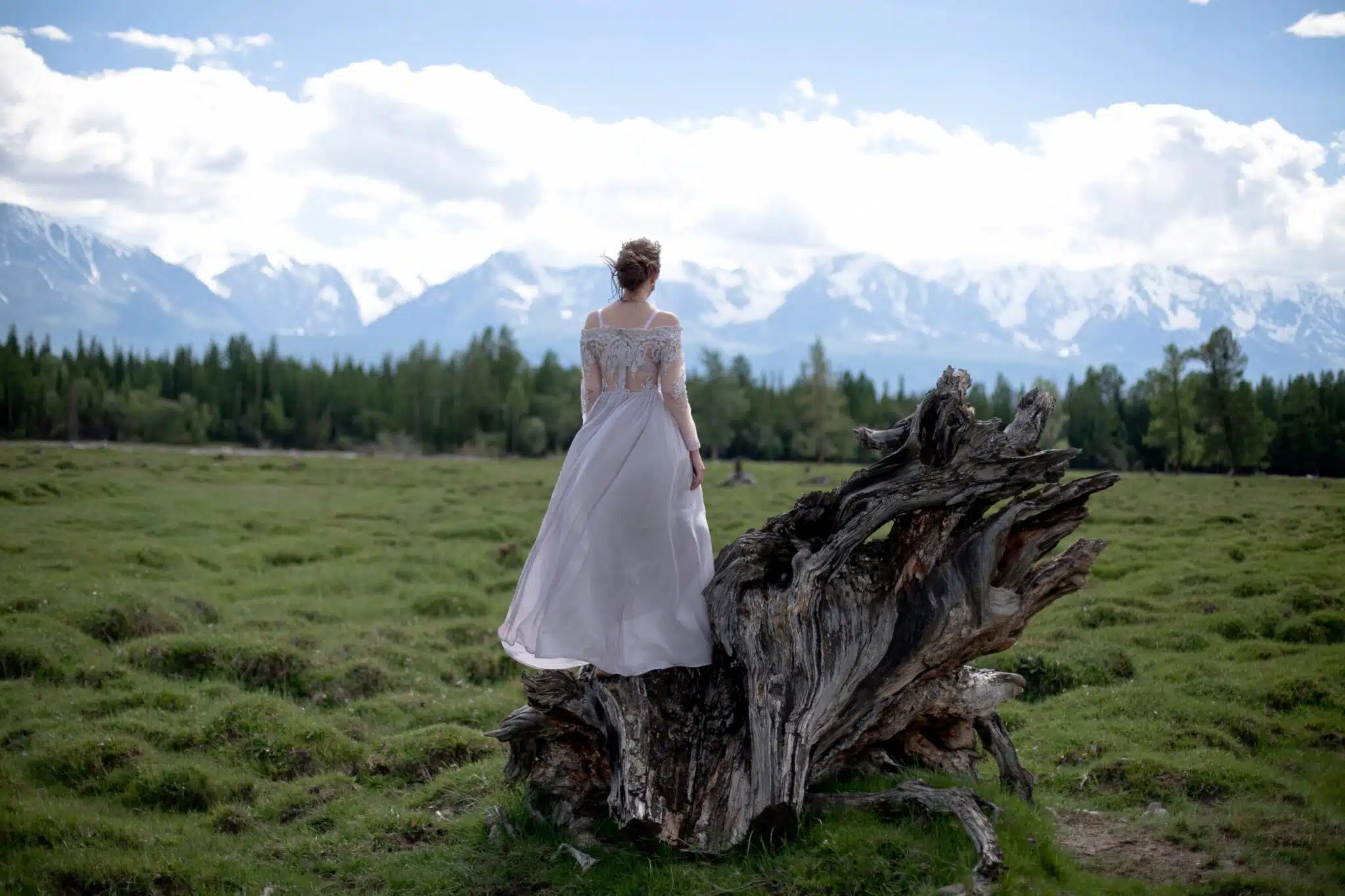
“The Wishing-Cap” by Katharine Lee Bates
A little maid stole to a moonlight knoll,
In the fairy ring to tread ;
But the dancing fays had gone their ways
And a gnome was there instead.
“Brown gnome, please lend me your wishing-cap.”
He snatched off his small, green hood
And tossed it to her. “Many thanks, kind sir;
You are certainly very good.
“Seven times one! And what shall I wish?”
The gnome sat down on a thistle,
With his peaked red shoon pointed up to the moon,
And practiced an elfin whistle.
“I wish and I wish and I wish and I wish
That you were as rich as I,
Little brown gnome, for I’ve pennies at home,
And I don’t know what to buy.
“I wish and I wish and I wish and I wish
My heart were a wild-rose brier,
Where the bell-voiced veery when day grows weary,
Leads off the vesper choir.
“I wish my heart were a forest brook
A-ripple with sunshiny laughter,
Where to quench their thirst shy deer come first
And the pattering rabbits after.
“I wish my heart were a golden star
That guides over creamy foam
The shimmering sails through whistling gales
To the harbor lights of home.
“I wish my heart were a blade of grass,
Where Katydids all a-row
Tilt in the sun, singing high deeds done
Of Katydids long ago.
“I wish my heart were a rosy cloud
On the sunset edge of even,
That tenderly bears the children’s prayers
Through the open doors of Heaven.
“I wish my heart were as large, as large,
As large as the dome-like skies,
There’s so much to love, from God above
To the little gossamer flies.”
Then the lassie gave back the small green hood
And curtsied to the gnome,
And the lilies sweet caressed her feet,
As the glow-worms lit her home.
The gnome dived under the hard, gray rocks
To the land where the gnome-folk dwell ;
A land of gold and jewels untold,
Hard by the gates of hell.
But while he sate in his wishing-cap
On the throne in his diamond castle,
Squeaked his wee brown wife, in a voice like a fife:
“Why! there’s a tear on the tassel I”
And never a pearl rom the Indian seas,
Nor emerald cold and clear,
Shed such a light through those caves of night
As the little gnome-king’s tear.
“The Troll” by Katharine Lee Bates
He was only an ugly Troll,
And an ugly Troll was he;
His eyes were saucers, and his guffaw, sirs,
Would scare you into the sea.
Oh, droll to be a Troll,
With green pine-needle hair,
And hoards of jewel stacked up like fuel
In the hill of Don’t-Know-Where.
He was only a stupid Troll,
As all the Troll-folk be,
Sailing a-straddle, his nose for a paddle,
On a solid gold settee.
Oh, droll to be a Troll,
And never so much as mind
Gravitation or botheration
Or the witch that rides the wind.
But he was a merry Troll,
With a harp against his knee,
And when he played it, all things obeyed it,
A-capering for glee.
Oh, droll to be a Troll,
And sail and sail and sail
Over your troubles like dancing bubbles
To your home in a fairy-tale.
“The Fairy-Ring” by Eugène Neustadt
As the moonlight fell
On a dreaming dove
That in sylvan dell
Nestled near his love,
A ring of fairies, fleet and bright,
Danced softly, tripping in the light
That pierced the leafy domes.
Then a magic spark
Lit each leaf and flower,
And illumed the dark
Like a diamond shower,
And fireflies swept through the air
Or, gently swaying, twinkled there,
Like tiny brilliant lamps.
Weasels, badgers, moles,
Startled by the sight,
From their mossy holes
Peer into the night,
While bats and brilliant butterflies,
And moths, with gaudy wings, uprise
To see the fairies trip.
Rabbits, hares and deer,
Birds and beasts of prey,
Timidly draw near
To the sylvan play,
An audience such as ne er was seen
Forms round the fairies on the green,
To watch their lithesome dance.
“The babe then joins the
whirling ring,
And round and round
the fairies swing.”
Hark! what mystic sound
Breaks upon the ear?
From the woods around
Elves and gnomes appear,
They chant a song now sweet, now wild,
And in their midst a pale dead child
They bring upon a bier.
‘Tis their Fairy Queen
Whom they fftte to-night,
And the woods are seen
Quivering with delight.
To her the lifeless babe they bring,
And placing it amid the ring,
They wait her magic touch.
Lo! the Queen just bends
O er the wan cold face,
And with loving hands
Loosens Death s embrace.
The babe then joins the whirling ring,
And round and round the fairies swing,
In circles full of grace;
Ever on they fly,
Faster grows their pace,
Flashing past the eye
In their elfin race,
Till mist and babe and fairies blend
And rise, as early dawn doth send
Its gray light on the day.
As the sunlight fell
On two billing doves
In a sylvan dell
Where they cooed their loves,
No sign of fairies bright and fleet,
Of softly tripping, tiny feet,
Was seen in all the wood.
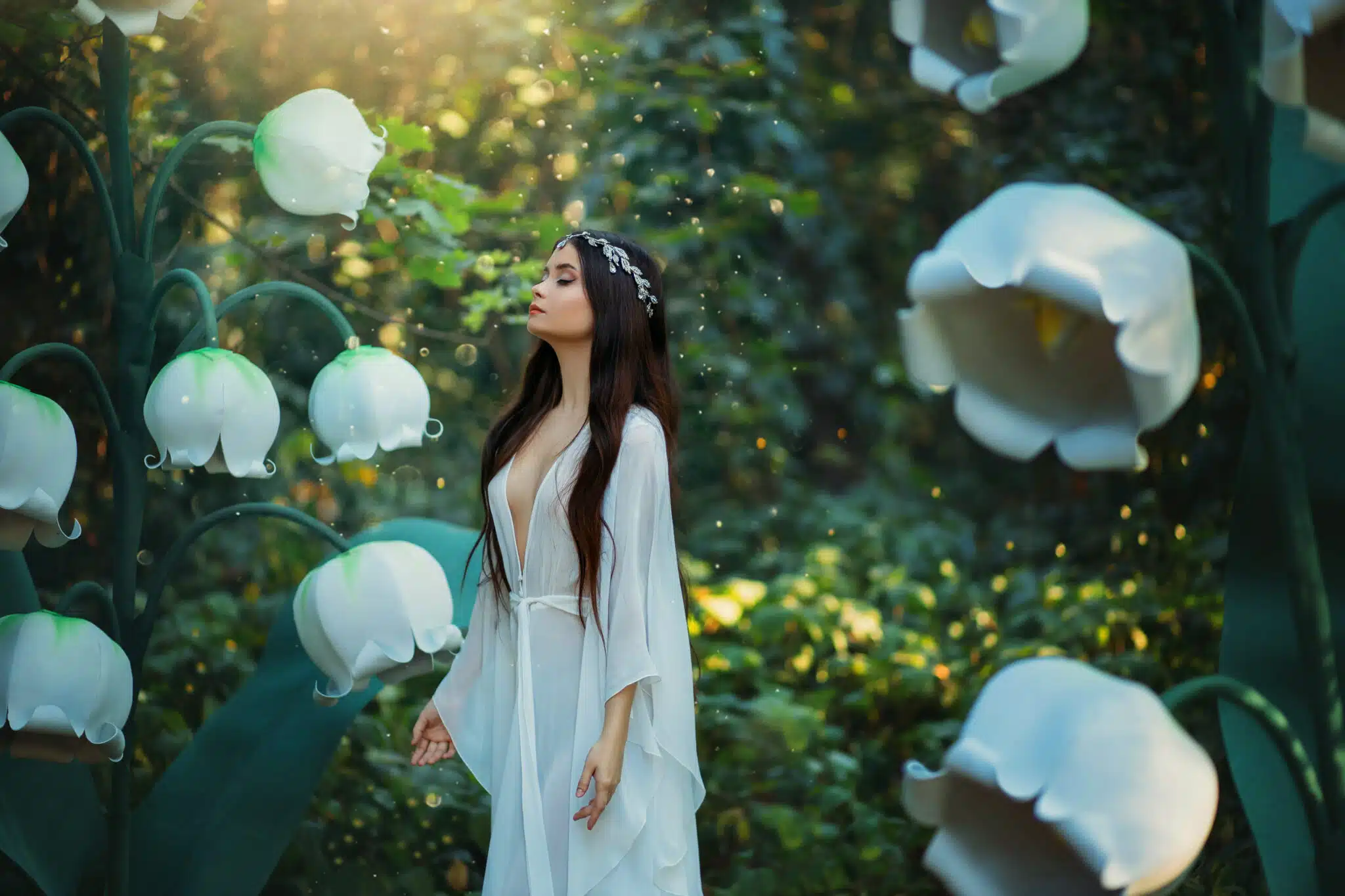
“Lord Rubadub” by Menella Bute Smedley
‘Neath the shade of a daisy, just two inches high,
A poor little fairy sits weeping alone;
She says, “What a desolate creature am I,
My Lord Rubadub has the heart of a stone!
“He will not allow me to dance on a cherry,
To swing in a cobweb, or ride on a bee;
He tells me to hush when I want to be merry,
Which is hard on a gay little fairy like me.
“Our queen is so delicate, dainty, and dear,
But I fear she will marry my Lord Rubadub.
He struts at her side with a lounge and a leer,—
I wonder she’ll look at the dandified cub!
“To fly from the court I announced my intention,
But Rubadub says (and I fancy ’tis true),
I must serve seven years, or I’ll not get my pension;
So what is a poor little fairy to do?
“Lord Rubadub’s head is as large as my house;
His legs stride as far as the north from the south;
He can hold in his hand that big monster, the mouse;
And he puts a whole dinner at once in his mouth!
“I do not deny he has wit and acumen,
But he’s dreadfully fat and disgracefully tall;
I think he’s a changeling, a thing they call human;
I do not believe he’s a fairy at all!
“But, hush! here he comes.” So she hid in the moss,
While vulgarly saunter’d, in insolent pride,
A fat little boy, who appear’d rather cross,
Though the beautiful fairy queen flew at his side.
He flung himself down with a flop on the daisy,
And sticking a meerschaum his thick lips between,
Bawl’d out, “Look alive there—Flare up—Don’t be lazy,
But fan me to sleep with your wings, fairy queen!”
The delicate fairy queen perch’d on his nose,
And flapping her gossamer wings up and down,
The cross little fellow is wrapt in repose—
A sneer on his lips, on his forehead a frown.
The delicate fairy queen falters and flutters,
Afraid to desist. Ah, what slavery this!
But the fairy that’s hid in the moss slily mutters,
“Now, now is the moment to test what he is!”
She creepeth along, (we can all guess what for,
For who is so stupid as not to have heard
That test of a fairy, that signal of awe,
That almost unspeakable, horrible word!)
She creepeth along, coming nearer and nearer;
She reacheth one ear (for the creature has two!)
Then shouts, and no bell than her voice sounded clearer,
That almost unspeakable word, “Bugaboo!”
Hey presto, he’s gone! Down, down on the grass
Drops the queen from the wonderful height of his nose.
Was he here? has he vanish’d? did none see him pass?
Hey presto, he’s gone! but how, nobody knows!
The sly little creature laughs out in derision;
The queen’s tears would soon float a fine fairy fish.
Then clapping their hands, they exert fairy vision;
And flapping their wings, they see all that they wish.
They see a big chamber, in whose boundless space
Sit fifty big boys, with big books in their hands,
And, lo! in the centre, in dreadful disgrace,
On a high stool of penance, Lord Rubadub stands.
Oh, fairy queen, faint not! that brow which thy kisses
So often have touch’d, like the wing of a fly,
Is crown’d with a fool’s cap of paper, where this is
Engraved in black letters a hundred feet high:—
Tom the Truant, that’s all; Tom the Truant—alas!
Oh, fairy queen, weep, for thy darling they snub!
Oh, weep that such glory so lightly should pass,
To find a cow’d schoolboy in Lord Rubadub!
The fairies are sorry,—they surely have reason;
To see him stand there makes their tender hearts ache;
And their queen wore half-mourning for many a season,
And rode a blackbeetle for Rubadub’s sake.
“The Elf-Folk and Little Mabel” by Archibald Maclaren
Whisper, whisper through the grove-
‘Tis the evening breeze
Telling all its tale of love
To the aspen trees,
And its earnest wooing brings
Tremblings strange and flutterings
To the listening trees.
Twinkle, twinkle o’er the grass
Is it shade ? is it light ?
Or do both together pass
Across the sward to- night ?
Twinkle, twinkle dark and sheen,
Mantle fold and feet between,
Glancing feet and mantles green,
Greener than the grass, I ween
Mingling shade and light.
Trooping, trooping on they go,
O’er the dewy grass
Little feet as white as snow
Twinkling as they pass,
O’er the grass their mantles sweep,
And the daisies, roused from sleep,
Half unclose their dreamy eyes,
Timidly and with surprise
Nothing but the starry skies,
And the dewy grass.
Listen, listen ! All is still—-
Mabel is asleep.
Up upon the window sill
Where nasturtiums creep ;
All into the room have gone—
Sound of turning hinge was none
Past the box of mignonette,
In the latticed window set,
To the curtained bassinette—
Mabel is asleep.
Softly, softly! First they breathe
On her closed eyes
Her cheek the jetty fringe beneath
White as ivory lies!
Then across her rosy lips
They deftly draw their finger tips,
And the colour flies!
Then her taper hands they place
Together, palm and palm,
As we see in Holy Place
Angel pure and calm
Carven on an infant’s tomb,
So within the silent room,
Half in light and half in gloom,
Lies she pure and calm.
Then her snowy smock is wound,
Oh, so tenderly,
Both her tiny feet around
Could her mother see !
They wrap her in their mantles green,
Covering at once and screen ;
Screen from glancing beams of light,
Covering from dews of night,
Closely, carefully.
Bustle, bustle ! Every one
Out into the light-
‘Tis the eve of good St. John,
And the moon is bright
Quickly, quickly o’er the grass
Of the dewy meadows pass,
Hasten, hasten to the shade
By the quivering aspens made,
While they whisper overhead
With the breeze of night.
In between the aspens grey
Glide the Elfin band;
They have carried far away
To their own green land
Little Mabel, good and fair,
Never to know pain or care,
Only happiness is thereIn the Elfin Land.
“A-Tishoo” by Walter De la Mare
“Sneeze, Pretty, sneeze, Dainty,
Else the Elves will have you sure,
Sneeze, Light-of-Seven-Bright-Candles,
See they’re tippeting at the door;
Their wee feet in measure falling,
All their little voices calling,
Calling, calling, calling, calling
Sneeze, or never come no more!”
“A-tishoo!”
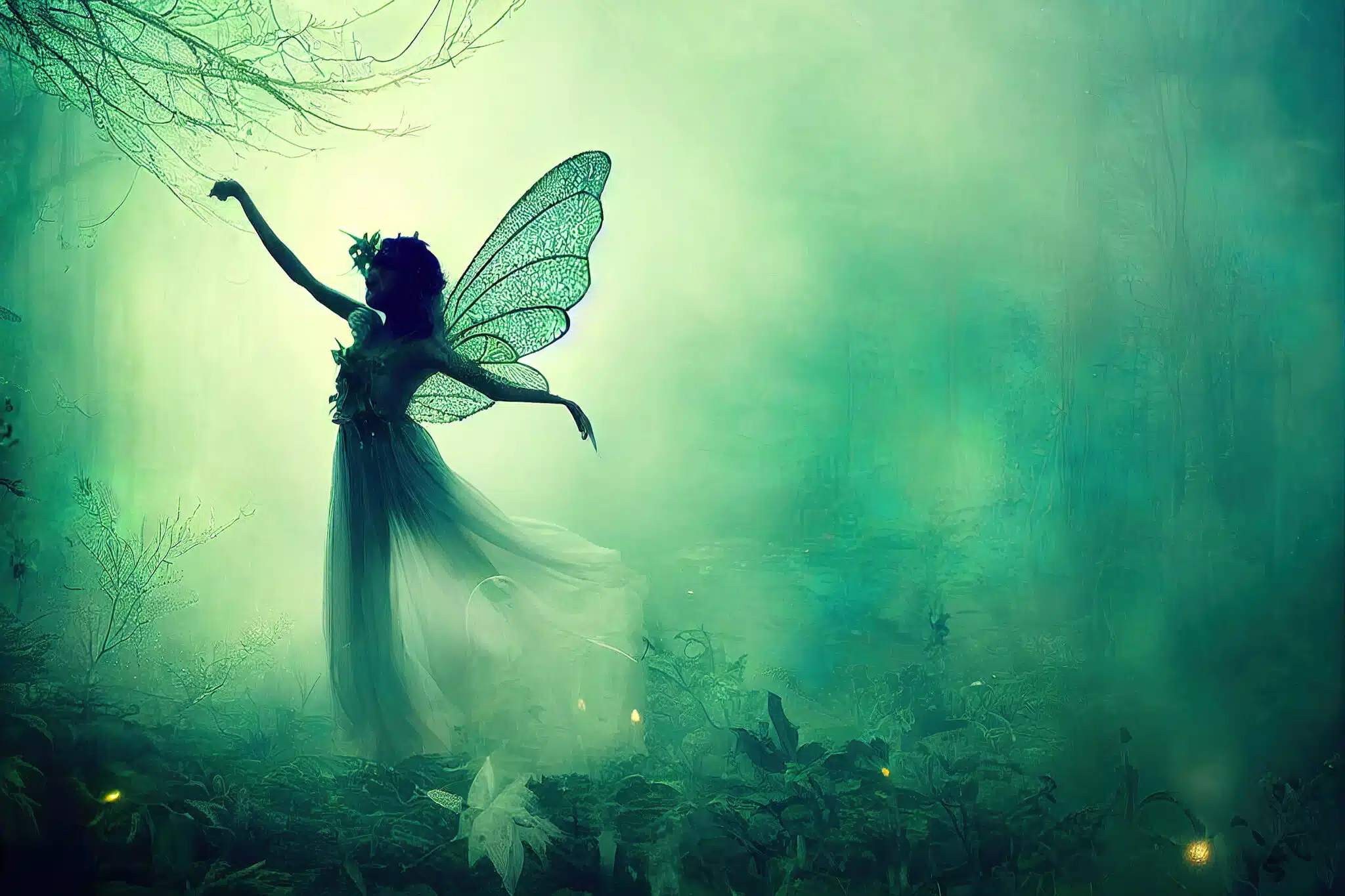
“The Double” by Walter De la Mare
I curtseyed to the dovecote.
I curtseyed to the well.
I twirled me round and round about,
The morning sweets to smell.
When out I came from spinning so,
Lo, betwixt green and blue
Was the ghost of me a Fairy Child
A-dancing dancing, too.
Nought was of her wearing
That is the earth’s array.
Her thistledown feet beat airy fleet
Yet set no blade astray.
The gossamer shining dews of June
Showed grey against the green;
Yet never so much as a bird-claw print
Of footfall to be seen.
Fading in the mounting sun
That image soon did pine.
Fainter than moonlight thinned the locks
That shone as clear as mine.
Vanished! Vanished! O, sad it is
To spin and spin in vain;
And never to see the ghost of me
A-dancing there again.
“The Unfinished Dream” by Walter De la Mare
Rare-sweet the air in that unimagined country
My spirit had wandered far
From its weary body close-enwrapt in slumber
Where its home and earth-friends are;
A milk-like air and of light all abundance;
And there a river clear
Painting the scene like a picture on its bosom,
Green foliage drifting near.
No sign of life I saw, as I pressed onward,
Fish, nor beast, nor bird,
Till I came to a hill clothed in flowers to its summit,
Then shrill small voices I heard.
And I saw from concealment a company of elf-folk
With faces strangely fair,
Talking their unearthly scattered talk together,
A bind of green-grasses in their hair,
Marvellously gentle, feater far than children,
In gesture, mien and speech,
Hastening onward in translucent shafts of sunshine,
And gossiping each with each.
Straw-light their locks, on neck and shoulder falling,
Faint of almond the silks they wore,
Spun not of worm, but as if inwoven of moonbeams
And foam on rock-bound shore;
Like lank-legged grasshoppers in June-tide meadows,
Amalillios of the day,
Hungrily gazed upon by me a stranger,
In unknown regions astray.
Yet, happy beyond words, I marked their sunlit faces,
Stealing soft enchantment from their eyes,
Tears in my own confusing their small image,
Harkening their bird-like cries.
They passed me, unseeing, a waft of flocking linnets;
Sadly I fared on my way;
And came in my dream to a dreamlike habitation,
Close-shut, festooned and grey.
Pausing, I gazed at the porch dust-still, vine-wreathed,
Worn the stone steps thereto,
Mute hung its bell, whence a stony head looked
downward,
Grey ‘gainst the sky’s pale-blue
Strange to me: strange. …
“The Three Beggars” by Walter De la Mare
‘Twas autumn daybreak gold and wild,
While past St. Ann’s grey tower they shuffled,
Three beggars spied a fairy-child
In crimson mantle muffled.
The daybreak lighted up her face
All pink, and sharp, and emerald-eyed;
She looked on them a little space,
And shrill as hautboy cried:
“O three tall footsore men of rags
Which walking this gold morn I see,
What will ye give me from your bags
For fairy kisses three?”
The first, that was a reddish man,
Out of his bundle takes a crust:
“La, by the tombstones of St. Ann,
There’s fee, if fee ye must!”
The second, chat was a chestnut man,
Out of his bundle draws a bone:
“Lo, by the belfry of St. Ann,
And all my breakfast gone!”
The third, that was a yellow man,
Out of his bundle picks a groat,
“La, by the Angel of St. Ann,
And I must go without.”
That changeling, lean and icy-lipped,
Touched crust, and bone, and groat, and lo!
Beneath her finger taper-tipped
The magic all ran through.
Instead of crust a peacock pie,
Instead of bone sweet venison,
Instead of groat a white lily
With seven blooms thereon.
And each fair cup was deep with wine:
Such was the changeling’s charity,
The sweet feast was enough for nine,
But not too much for three.
O toothsome meat in jelly froze!
O tender haunch of elfin stag!
O rich the odour that arose!
O plump with scraps each bag!
There, in the daybreak gold and wild,
Each merry-hearted beggar man
Drank deep unto the fairy child,
And blessed the good St. Ann.
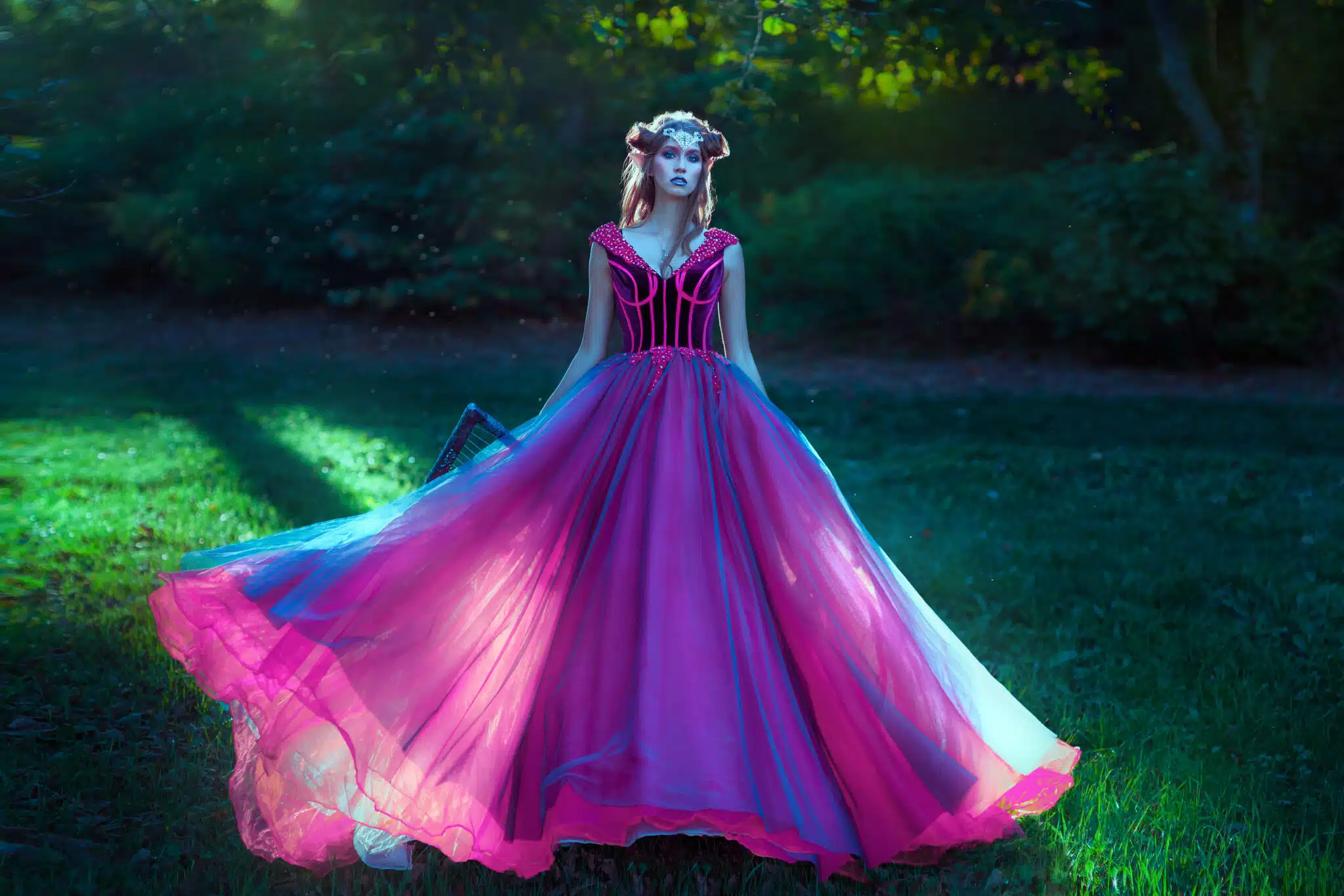
“The Horn” by Walter De la Mare
Hark! is that a horn I hear,
In cloudland winding sweet
And bell-like clash of bridle-rein,
And silver-shod light feet?
Is it the elfin laughter
Of fairies riding faint and high,
Beneath the branches of the moon,
Straying through the starry sky?
Is it in the globed dew
Such sweet melodies may fall?
Wood and valley all are still,
Hushed the shepherd’s call.
“Peak and Puke” by Walter De la Mare
From his cradle in the glamourie
They have stolen my wee brother,
Roused a changeling in his swaddlings
For to fret mine own poor mother.
Pules it in the candle light
Wi’ a cheek so lean and white,
Chinkling up its eyne so wee,
Wailing shrill at her an’ me.
It we’ll neither rock nor tend
Till the Silent Silent send,
Lapping in their waesome arms
Him they stole with spells and charms,
Till they take this changeling creature
Back to its own fairy nature –
Cry! Cry! as long as may be,
Ye shall ne’er be woman’s baby!
“Sleepyhead” by Walter De la Mare
As I lay awake in the white moonlight
I heard a faint singing in the wood,
“Out of bed,
Sleepyhead,
Put your white foot, now;
Here are we
Beneath the tree
Singing round the root now.”
I looked out of window, in the white moonlight,
The leaves were like snow in the wood –
“Come away,
Child, and play
Light with the gnomies;
In a mound,
Green and round,
That’s where their home is.
“Honey sweet,
Curds to eat,
Cream and frumenty,
Shells and beads,
Poppy seeds,
You shall have plenty.”
But, as soon as I stooped in the dim moonlight
To put on my stocking and my shoe,
The sweet shrill singing echoed faintly away,
And the grey of the morning peeped through,
And instead of the gnomies there came a red robin
To sing of the buttercups and dew.

“The Midden’s Song” by Walter De la Mare
“Bubble, Bubble,
Swim to see
Oh, how beautiful
I be.
“Fishes, Fishes,
Finned and fine,
What’s your gold
Compared with mine?
“Why, then, has
Wise Tishnar made
One so lovely,
Yet so sad?
“Lone am I,
And can but make
A little song,
For singing’s sake.”
“The Elf Singing” by William Allingham
An Elf sat on a twig,
He was not very big,
He sang a little song,
He did not think it wrong;
But he was on a Wizard’s ground,
Who hated all sweet sound.
Elf, Elf,
Take care of yourself!
He’s coming behind you,
To seize you and bind you,
And stifle your song.
The Wizard! the Wizard!
He changes his shape
In crawling along,
An ugly old ape,
A poisonous lizard,
A spotted spider,
A wormy glider,
The Wizard! the Wizard!
He’s up on the bough,
He’ll bite through your gizzard
He’s close to you now!
The Elf went on with his song,
It grew more clear and strong,
It lifted him into air,
He floated singing away,
With rainbows in his hair;
While the Wizard-worm from his creep
Made a sudden leap,
Fell down into a hole,
And, ere his magic word he could say,
Was eaten up by a Mole.
Poems About Fairies in the Garden
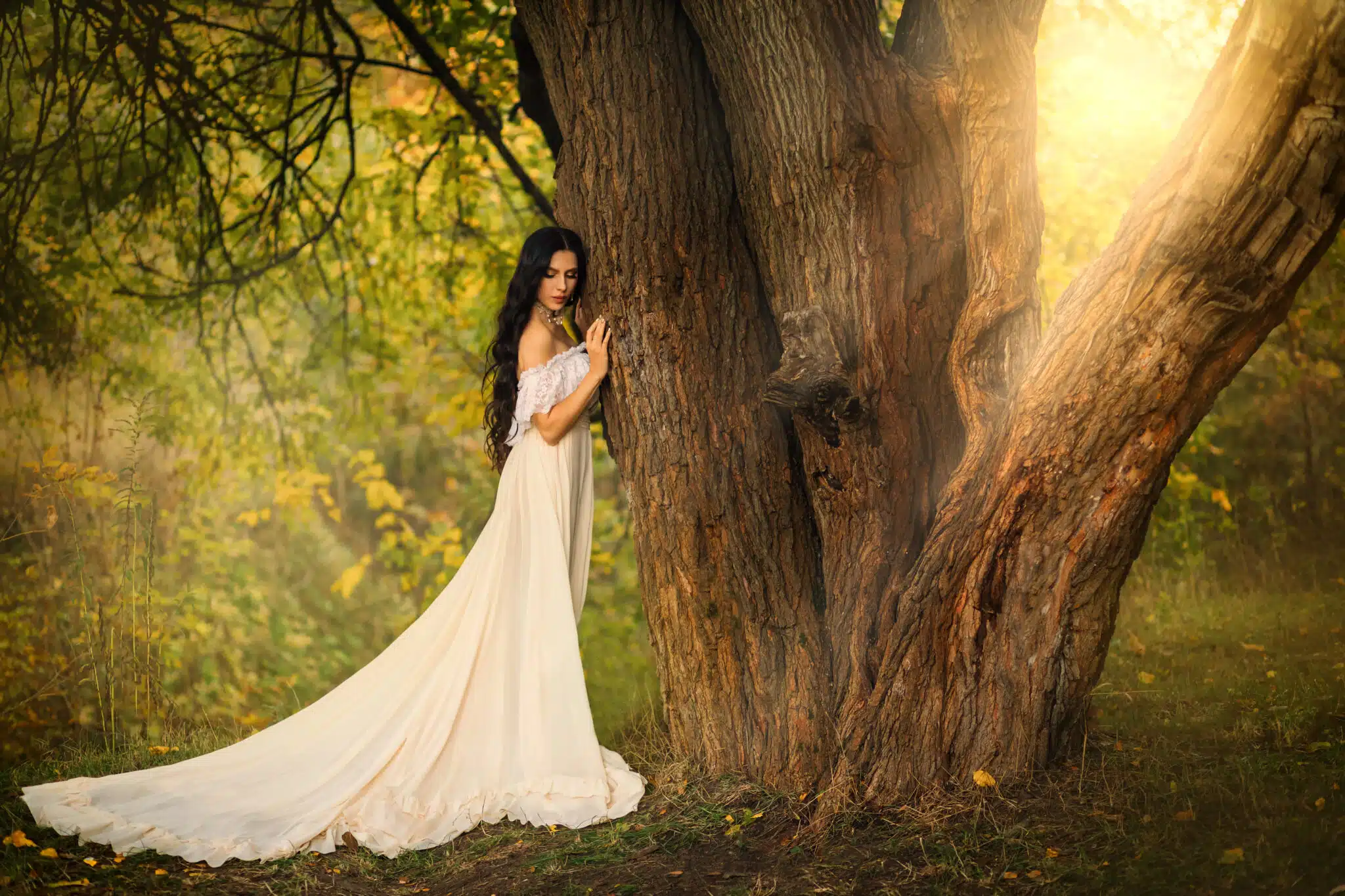
“The Faery Forest” by Sara Teasdale
The faery forest glimmered
Beneath an ivory moon,
The silver grasses shimmered
Against a faery tune.
Beneath the silken silence
The crystal branches slept,
And dreaming thro’ the dew-fall
The cold white blossoms wept.
“Faery Songs” by John Keats
I.
Shed no tear! oh, shed no tear!
The flower will bloom another year.
Weep no more! oh, weep no more!
Young buds sleep in the root’s white core.
Dry your eyes! oh, dry your eyes!
For I was taught in Paradise
To ease my breast of melodies,–
Shed no tear.
Overhead! look overhead!
‘Mong the blossoms white and red–
Look up, look up! I flutter now
On this fresh pomegranate bough.
See me! ’tis this silvery bill
Ever cures the good man’s ill.
Shed no tear! oh, shed no tear!
The flower will bloom another year.
Adieu, adieu — I fly — adieu!
I vanish in the heaven’s blue,–
Adieu, adieu!
II.
Ah! woe is me! poor silver-wing!
That I must chant thy lady’s dirge,
And death to this fair haunt of spring,
Of melody, and streams of flowery verge,–
Poor silver-wing! ah! woe is me!
That I must see
These blossoms snow upon thy lady’s pall!
Go, pretty page! and in her ear
Whisper that the hour is near!
Softly tell her not to fear
Such calm favonian burial!
Go, pretty page! and soothly tell,–
The blossoms hang by a melting spell,
And fall they must, ere a star wink thrice
Upon her closed eyes,
That now in vain are weeping their last tears,
At sweet life leaving, and these arbours green,–
Rich dowry from the Spirit of the Spheres,
Alas! poor Queen!
“Fairies” by Madison Julius Cawein
On the tremulous coppice,
From her plenteous hair,
Large golden-rayed poppies
Of moon-litten air
The Night hath flung there.
In the fern-favored hollow
The fire-flies fleet
Uncertainly follow
Pale phantoms of heat,
Druid shadows that meet.
Hidden flowers are fragrant;
The night hazes furl
O’er the solitudes vagrant
In purple and pearl,
Sway-swinging and curl.
From moss-cushioned valley
Where the red sunlight fails,
Rocks where musically
The hollow spring wails,
And the limber fern trails,
With a ripple and twinkle
Of luminous arms,
Of voices that tinkle,
And feet that are storms
Of chaste, naked charms,
Like echoes that revel
On hills, where the brier
Vaults roofs of dishevel
And green, greedy fire,
They come as a choir.
At the root of the mountain
Where the dim forest lies,
By the spar-spouting fountain
Where the low lily dies,
With their star-stinging eyes.
They gather sweet singing
In voices that seem
Faint ringing and clinging
In dreams that we dream,
In visions that gleam.
Sweet lisping of kisses,
Dry rustle of hair;
A footfall that hisses
Like a leaf in the air
When the brown boughs are bare.
The music that scatters
From love-litten eyes;
The music that flatters
In words and low sighs,
In laughter that dies:
“Come hither, come hither,
In the million-eyed night,
Ere the moon-flowers wither
And the harvester white,
Morning reaps them with light.
“Come hither, where singing
Is pleasant as tears,
Or dead kisses, clinging
To the murdering years,
In memory’s ears.
“Come hither where kisses
Are waiting for you,
For lips and long tresses,
As for wild flowers blue
The moon-heated dew.
“Come hither from coppice
And violet dale,
The mountain whose top is
In vapors that sail
With pearly hail pale.
“Why tarry? come hither
While the molten moon beams,
Ere the golden spark wither
Of the glow-worm that gleams
Like a star in still streams!”
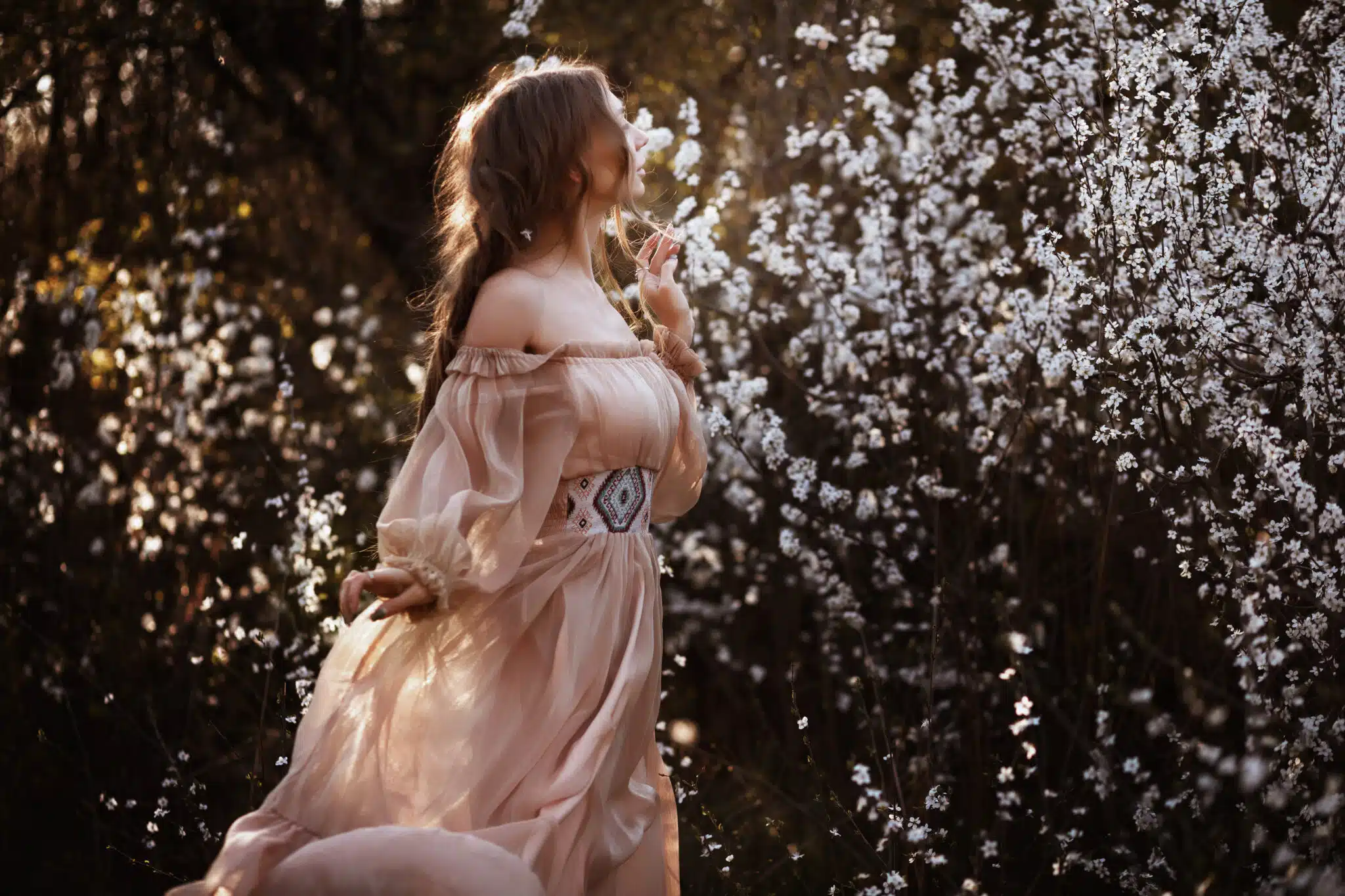
“Garden Fairies” by Philip Bourke Marston
Keen was the air, the sky was very light,
Soft with shed snow my garden was, and white,
And, walking there, I heard upon the night
Sudden sound of little voices,
Just the prettiest of noises.
It was the strangest, subtlest, sweetest sound,
It seemed above me, seemed upon the ground,
Then swiftly seemed to eddy round and round,
Till I said: “To-night the air is
Surely full of garden fairies.”
And all at once it seemed I grew aware
That little, shining presences were there,—
White shapes and red shapes danced upon the air;
Then a peal of silver laughter,
And such singing followed after
As none of you, I think, have heard.
More soft it was than call of any bird,
Note after note, exquisitely deferred,
Soft as dew-drops when they settle
In a fair flower’s open petal.
“What are these fairies?” to myself I said;
For answer, then, as from a garden’s bed,
On the cold air a sudden scent was shed,—
Scent of lilies, scent of roses,
Scent of Summer’s sweetest posies.
And said a small, sweet voice within my ear:
“We flowers, that sleep through winter, once a year
Are by our flower queen sent to visit here,
That this fact may duly flout us,—
Gardens can look fair without us.
“A very little time we have to play,
Then must we go, oh, very far away,
And sleep again for many a long, long day,
Till the glad birds sing above us,
And the warm sun comes to love us.
“Hark what the roses sing now, as we go;”
Then very sweet and soft, and very low,—
A dream of sound across the garden snow,—
Came the chime of roses singing
To the lily-bell’s faint ringing.
“Garden Fairies” by Philip Bourke Marston
ROSES’ SONG
“Softly sinking through the snow,
To our winter rest we go,
Underneath the snow to house
Till the birds be in the boughs,
And the boughs with leaves be fair,
And the sun shine everywhere.
“Softly through the snow we settle,
Little snow-drops press each petal.
Oh, the snow is kind and white,—
Soft it is, and very light;
Soon we shall be where no light is,—
But where sleep is, and where night is,—
Sleep of every wind unshaken,
Till our Summer bids us waken.”
Then toward some far-off goal that singing drew;
Then altogether ceased; more steely blue
The blue stars shone; but in my spirit grew
Hope of Summer, love of Roses,
Certainty that Sorrow closes.
“Bluebells” by Walter De la Mare
Where the bluebells and the wind are,
Fairies in a ring I spied,
And I heard a little linnet
Singing near beside.
Where the primrose and the dew are
Soon were sped the fairies all:
Only now the green turf freshens,
And the linnets call.
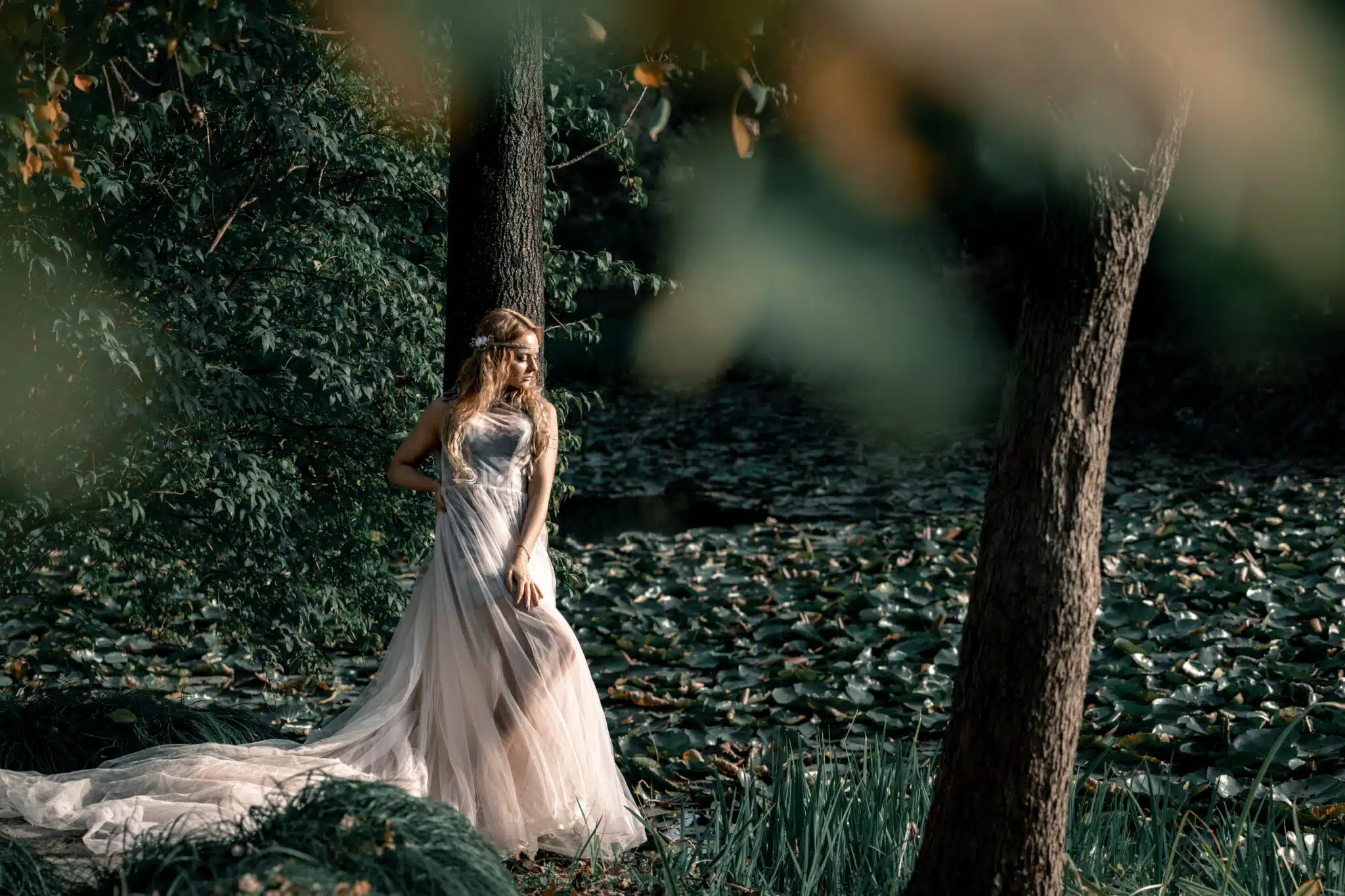
“The Flowers” by Robert Louis Stevenson
All the names I know from nurse:
Gardener’s garters, Shepherd’s purse,
Bachelor’s buttons, Lady’s smock,
And the Lady Hollyhock.
Fairy places, fairy things,
Fairy woods where the wild bee wings.
Tiny trees for tiny dames —
These must all be fairy names!
Tiny woods below whose boughs
Shady fairies weave a house;
Tiny tree-tops, rose or thyme,
Where the braver fairies climb!
Fair are grown-up people’s trees,
But the fairest woods are these;
Where if I were not so tall,
I should live for good and all.
“Down-Adown-Derry” by Walter De la Mare
Down-adown-derry,
Sweet Annie Maroon,
Gathering daisies
In the meadows of Doone,
Hears a shrill piping,
Elflike and free,
Where the waters go brawling
In rills to the sea;
Singing down-adown-derry.
Down-adown-derry,
Sweet Annie Maroon,
Through the green grasses
Peeps softly; and soon
Spies under green willows
A fairy whose song
Like the smallest of bubbles
Floats bobbing along;
Singing down-adown-derry.
Short Poems About Fairies
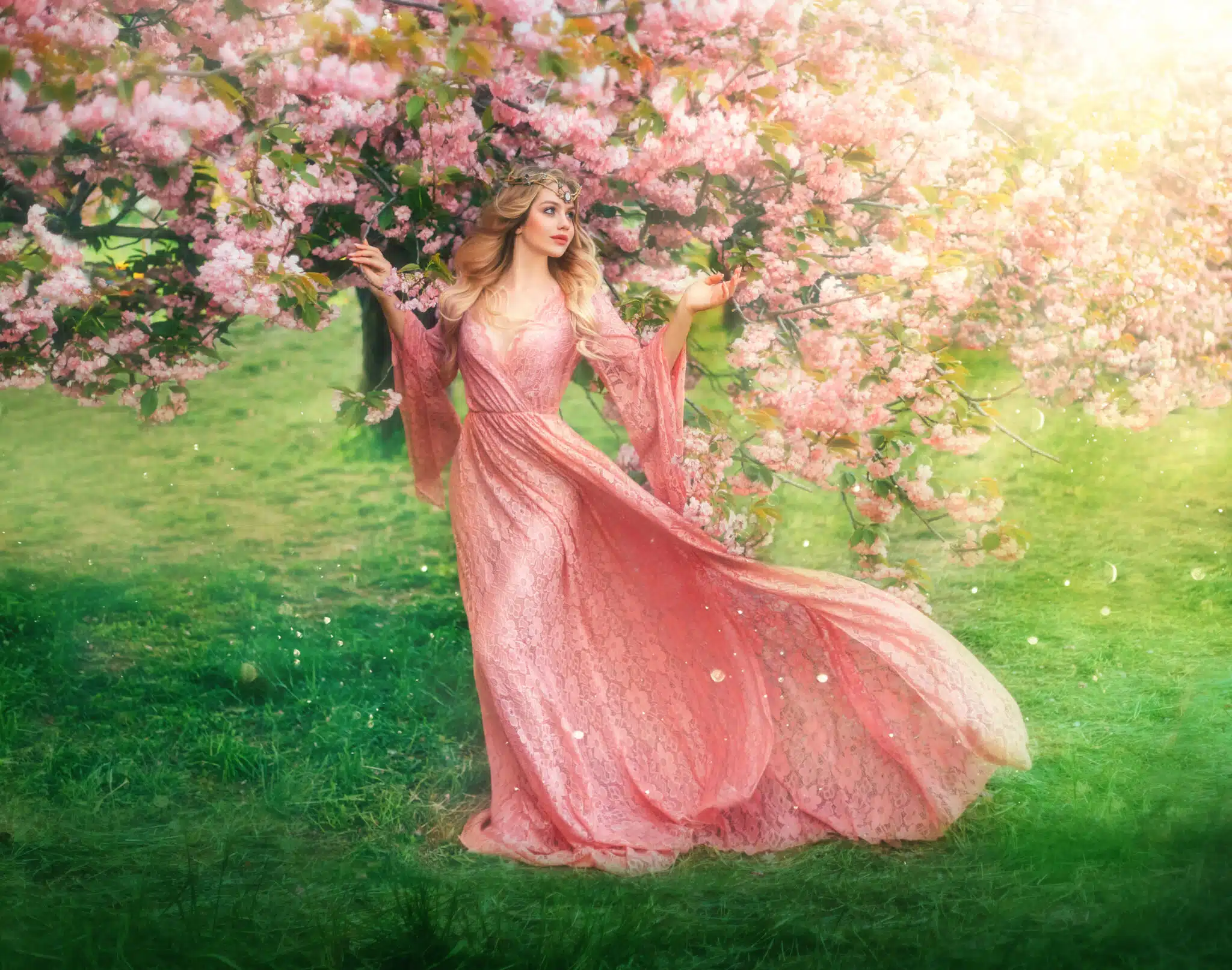
“The Fairies” by Robert Herrick
If ye will with Mab find grace,
Set each platter in his place;
Rake the fire up, and get
Water in, ere sun be set.
Wash your pails and cleanse your dairies,
Sluts are loathsome to the fairies;
Sweep your house; Who doth not so,
Mab will pinch her by the toe.
“Sonnet 7: Fairies” by Eric Mackay
Glory endures when calumny hath fled;
And fairies show themselves, in friendly guise,
To all who hold a trust beyond the dead,
And all who pray, albeit so worldly-wise,
With cheerful hearts or wildly-weeping eyes.
They come and go when children are in bed
To gladden them with dreams from out the skies
And sanctify all tears that they have shed!
Fairies are wing’d for wandering to and fro.
They live in legends; they survive the Greeks.
Wisdom is theirs; they live for us and grow,
Like things ambrosial, fairer than the freaks
Of signs and seasons which the poets know,
Or fires of sunset on the mountain-peaks.
“The Fairies Break Their Dances” by Alfred Edward Housman
The fairies break their dances
And leave the printed lawn,
And up from India glances
The silver sail of dawn.
The candles burn their sockets,
The blinds let through the day,
The young man feels his pockets
And wonders what’s to pay.
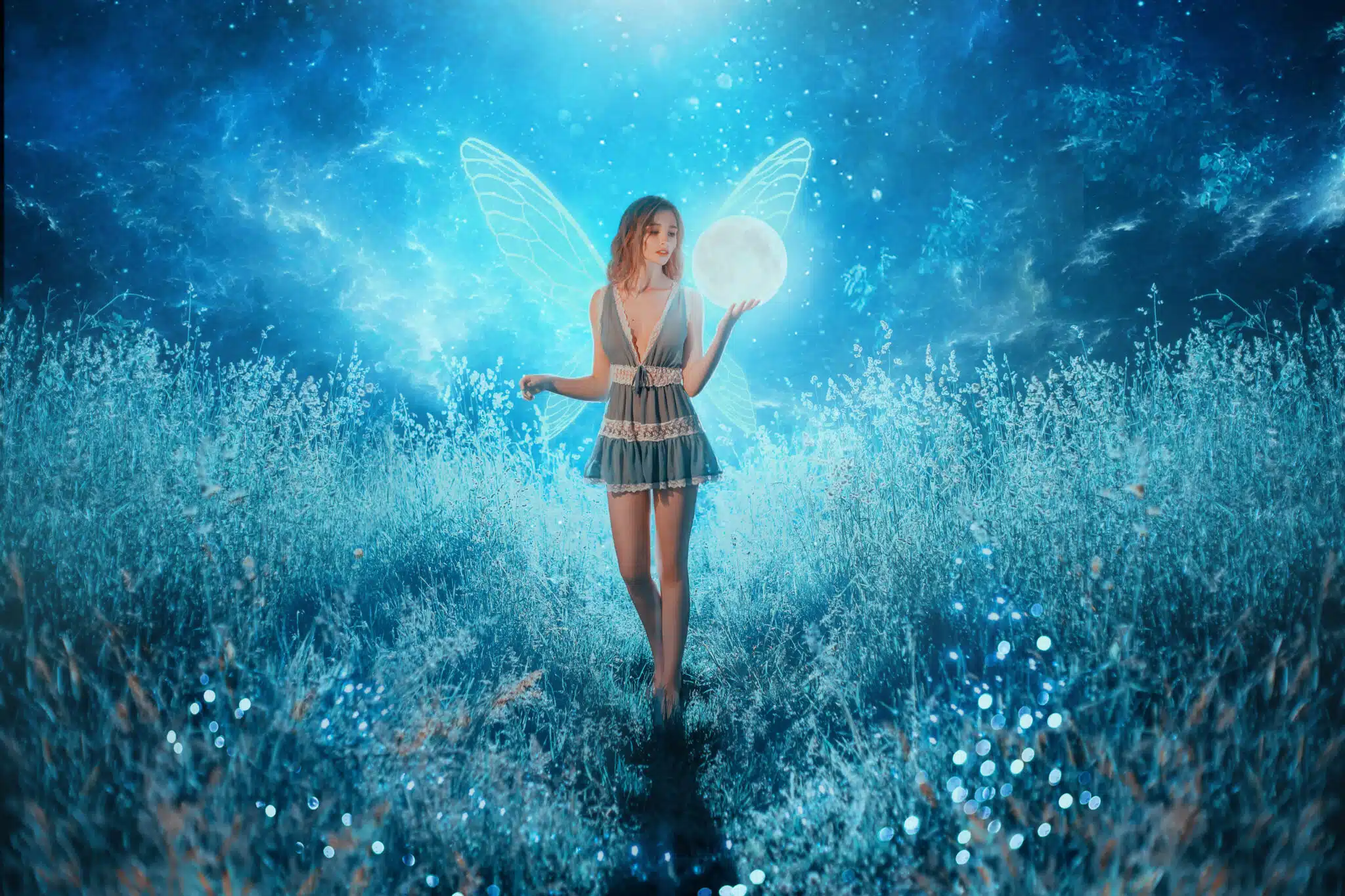
“Fairy Lanterns” by Clark Ashton Smith
‘Tis said these blossom-lanterns light
The elves upon their midnight way;
That fairy toil and elfin play
Receive their beams of magic white.
I marvel not if it be true;
I know this flower has lighted me
Nearer to Beauty’s mystery,
And past the veils of secrets new.
“The Ruin” by Walter De la Mare
When the last colours of the day
Have from their burning ebbed away,
About that ruin, cold and lone,
The cricket shrills from stone to stone;
And scattering o’er its darkened green,
Bands of the fairies may be seen,
Chattering like grasshoppers, their feet
Dancing a thistledown dance round it:
While the great gold of the mild moon
Tinges their tiny acorn shoon.
“The Lonesomest Fairy” by Mary Carolyn Davies
There’s a dewdrop shining bright
On the grass by the sun undried,
It’s a tear that fell in the night
When the lonesomest fairy cried.
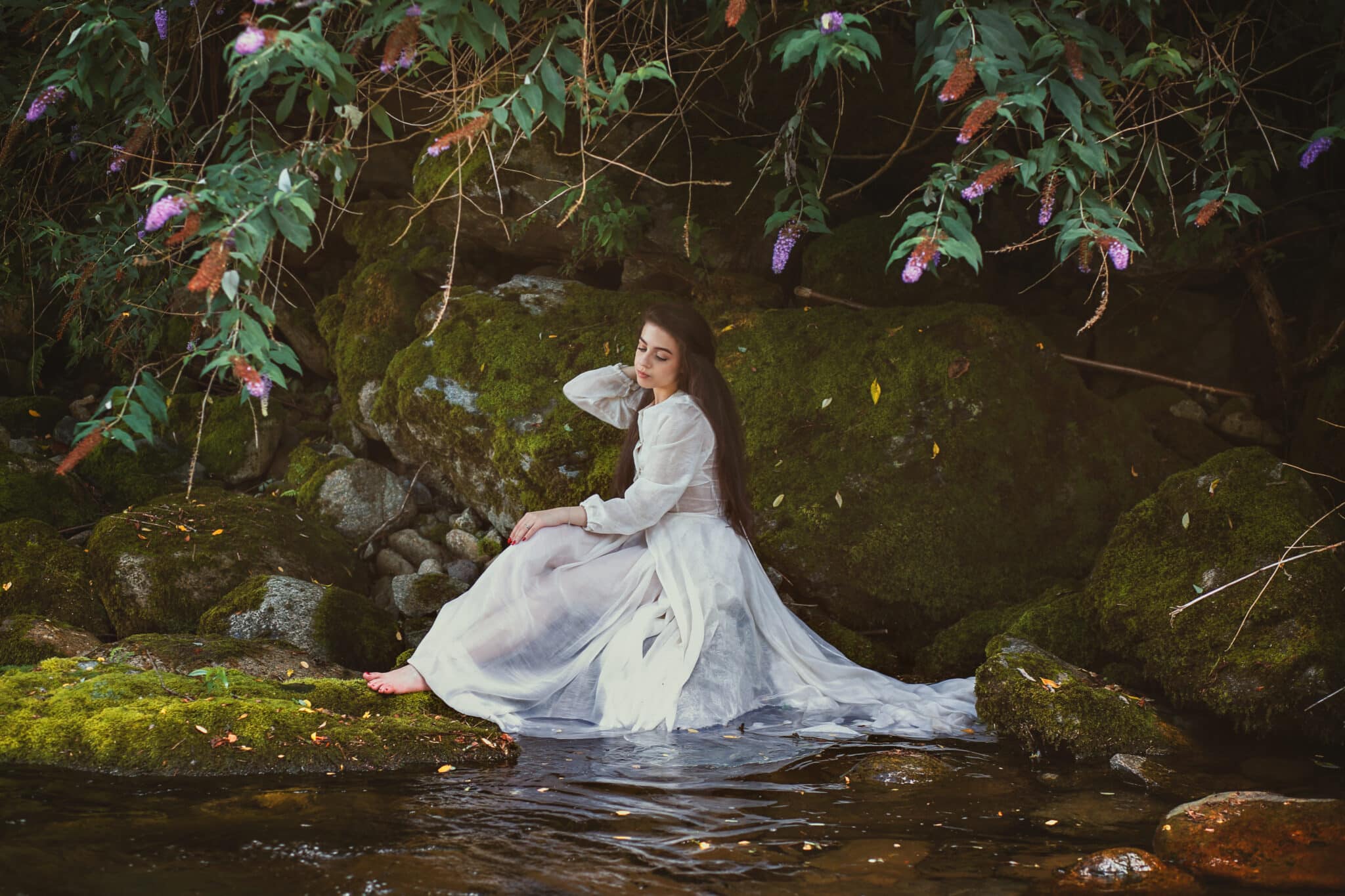
“As You Would Be Done By” by Mary Carolyn Davies
Of course I believe in fairies!
Of course I know they’re true!
—Just think, if you were a fairy,
And no one believed in you!
“Fairyland Secret Service” by Mary Carolyn Davies
A snowflake is a letter
A fairy in the sky
Is sending to the fairies here,
And, when they’ve read its message clear,
Lest any one should spy,
They purse their little lips and blow
To melt that tell-tale note of snow.
Oh, let us see if we can snatch
And read a Fairyland dispatch!
“Snowflakes” by Mary Carolyn Davies
The fairies called snowflakes all dressed up in white,
They went to the dance, and were dancing all night.
And now they lie tired, where sleep chanced to o’ertake them.
Step lightly, speak softly, take care not to wake them!
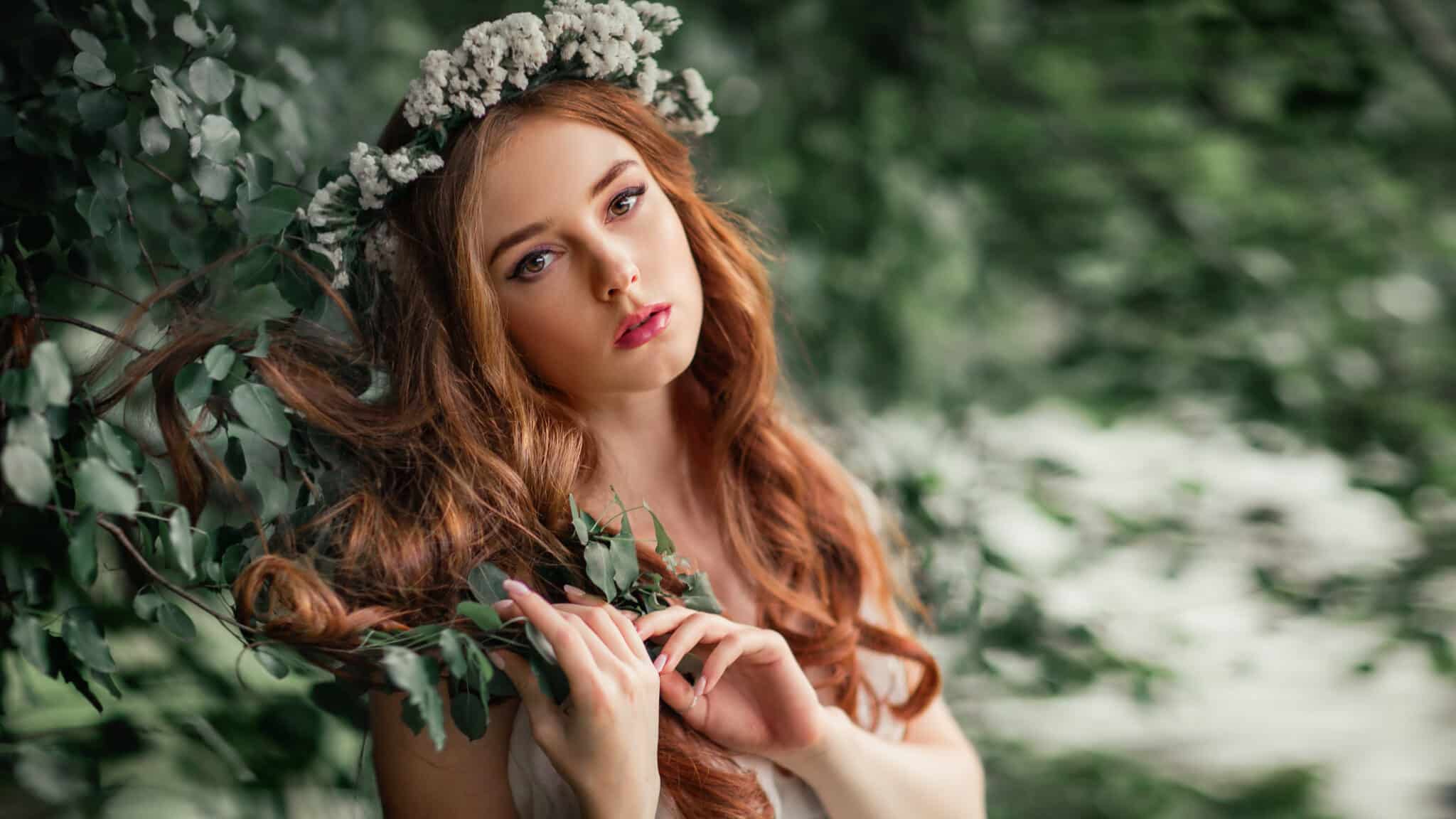
“A Charm” by Robert Herrick
In the morning when you rise
Wash your hands and cleanse your eyes ;
Next, be sure ye have a care
To disperse the water far ;
For as far as it doth light,
So far keeps the evil sprite.
Fairy Poems for Children

“The Fairies” by William Allingham
Up the airy mountain,
Down the rushy glen,
We daren’t go a-hunting
For fear of little men;
Wee folk, good folk,
Trooping all together;
Green jacket, red cap,
And white owl’s feather!
Down along the rocky shore
Some make their home,
They live on crispy pancakes
Of yellow tide-foam;
Some in the reeds
Of the black mountain lake,
With frogs for their watch-dogs,
All night awake.
High on the hill-top
The old King sits;
He is now so old and gray
He’s nigh lost his wits.
With a bridge of white mist
Columbkill he crosses,
On his stately journeys
From Slieveleague to Rosses;
Or going up with music
On cold starry nights,
To sup with the Queen
Of the gay Northern Lights.
They stole little Bridget
For seven years long;
When she came down again
Her friends were all gone.
They took her lightly back,
Between the night and morrow,
They thought that she was fast asleep,
But she was dead with sorrow.
They have kept her ever since
Deep within the lake,
On a bed of flag-leaves,
Watching till she wake.
By the craggy hill-side,
Through the mosses bare,
They have planted thorn-trees
For pleasure here and there.
Is any man so daring
As dig them up in spite,
He shall find their sharpest thorns
In his bed at night.
Up the airy mountain,
Down the rushy glen,
We daren’t go a-hunting
For fear of little men;
Wee folk, good folk,
Trooping all together;
Green jacket, red cap,
And white owl’s feather!
“The Fairy Boy” by Samuel Lover
A mother came when stars were paling
Wailing round a lonely spring;
Thus she cried while tears were falling,
Calling on the Fairy King:
came when stars were
Why with spells my child caressing,
Courting him with fairy joy;
Why destroy a mother’s blessing,
Wherefore steal my baby boy?
O’er the mountain, through the wild wood,
Where his childhood loved to play;
Where the flowers are freshly springing,
There I wander day by day.
There I wander, growing fonder
Of that child that made my joy;
On the echoes wildly calling
To restore my fairy boy.
“But in vain my plaintive calling,
Tears are falling all in vain!
He now sports with fairy pleasure,
He’s the treasure of their train!
“Fare thee well, my child for ever,
In this world I’ve lost my joy,
But in the next we ne’er shall sever,
There I’ll find my angel boy!
“The Fairy King” by William Allingham
“High on the hill-top
The old King sits;
He is now so old and gray
He’s nigh lost his wits.”
The Fairy King was old.
He met the Witch of the Wold.
“Ah ha, King!” quoth she,
“Now thou art old like me.”
“Nay, Witch!” quoth he,
“I am not old like thee.”
The King took off his crown,
It almost bent him down;
His age was too great
To carry such a weight.
“Give it here!” she said,
And clapt it on her head.
Crown sank to ground;
The Witch no more was found.
Then sweet spring-songs were sung,
The Fairy King grew young,
His crown was made of flowers,
He lived in woods and bowers.
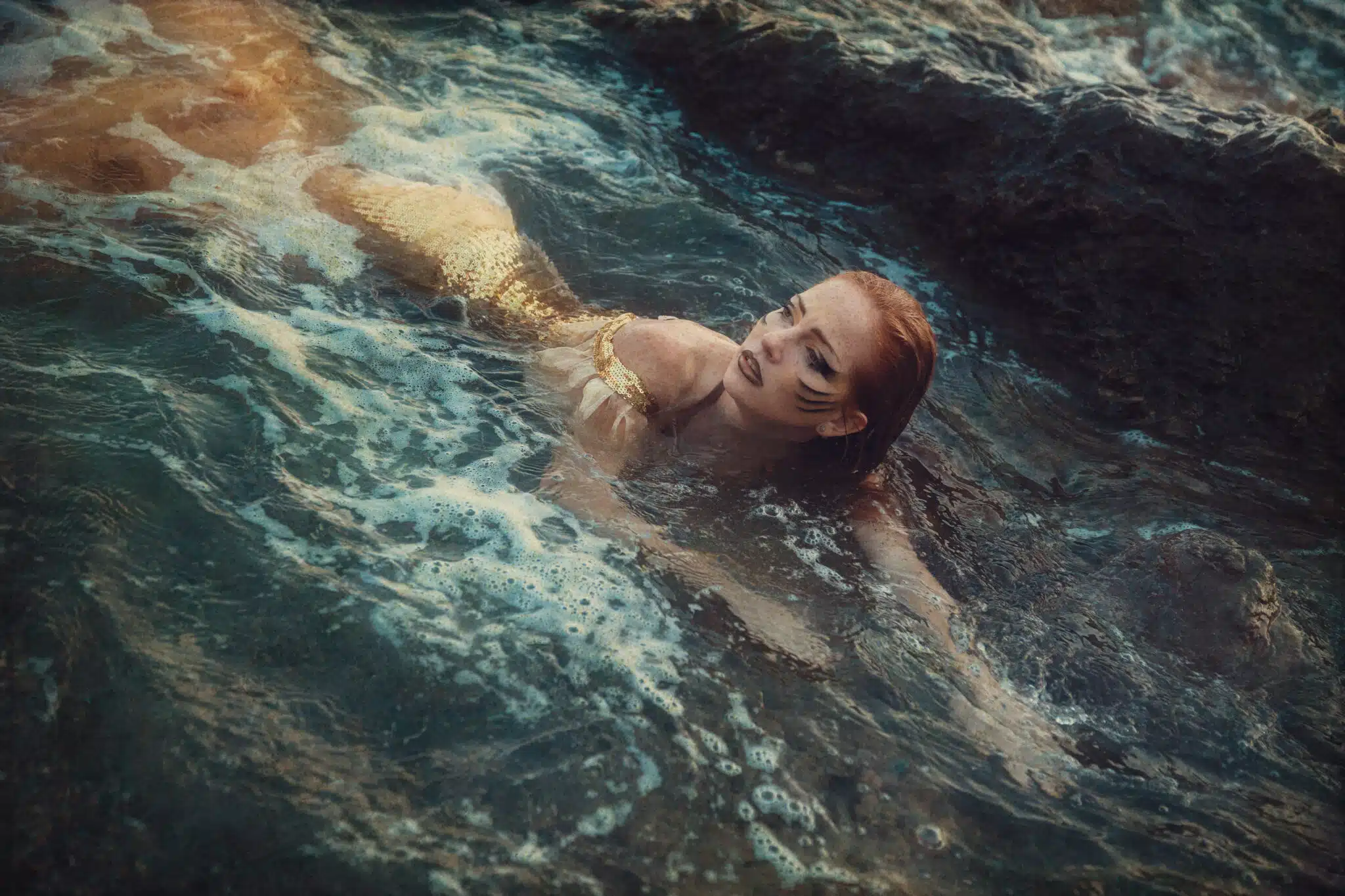
“The Mermaid” by Alfred Lord Tennyson
I.
Who would be
A mermaid fair,
Singing alone,
Combing her hair
Under the sea,
In a golden curl
With a comb of pearl,
On a throne?
II.
I would be a mermaid fair;
I would sing to myself the whole of the day;
With a comb of pearl I would comb my hair;
And still as I comb’d I would sing and say,
“Who is it loves me? who loves not me?”
I would comb my hair till my ringlets would fall,
Low adown, low adown,
From under my starry sea-bud crown
Low adown and around,
And I should look like a fountain of gold
Springing alone
With a shrill inner sound,
Over the throne
In the midst of the hall;
Till that great sea-snake under the sea
From his coiled sleeps in the central deeps
Would slowly trail himself sevenfold
Round the hall where I sate, and look in at the gate
With his large calm eyes for the love of me.
And all the mermen under the sea
Would feel their immortality
Die in their hearts for the love of me.
III.
But at night I would wander away, away,
I would fling on each side my low-flowing locks,
And lightly vault from the throne and play
With the mermen in and out of the rocks;
We would run to and fro, and hide and seek,
On the broad sea-wolds in the crimson shells,
Whose silvery spikes are nighest the sea.
But if any came near I would call, and shriek,
And adown the steep like a wave I would leap
From the diamond-ledges that jut from the dells;
For I would not be kiss’d by all who would list,
Of the bold merry mermen under the sea;
They would sue me, and woo me, and flatter me,
In the purple twilights under the sea;
But the king of them all would carry me,
Woo me, and win me, and marry me,
In the branching jaspers under the sea;
Then all the dry pied things that be
In the hueless mosses under the sea
Would curl round my silver feet silently,
All looking up for the love of me.
And if I should carol aloud, from aloft
All things that are forked, and horned, and soft
Would lean out from the hollow sphere of the sea,
All looking down for the love of me.
“Chorus of Fairies” by William Allingham
Golden, golden,
Light unfolding,
Busily, merrily, work and play,
In flowery meadows,
And forest shadows,
All the length of a Summer day!
All the length of a Summer day!
Sprightly, lightly,
Sing we rightly,
Moments brightly hurry away;
Fruit-tree blossoms,
And roses’ bosoms,—
Clear blue sky of a Summer day!
Dear blue sky of a Summer day!
Springlets, brooklets,
Greeny nooklets,
Hill and Valley, and salt sea-spray,
Comrade rovers,
Fairy lovers,—
All the length of a Summer day
All the livelong Summer day!
“The Waterfall” by Frank Dempster Sherman
Tinkle, tinkle!
Listen well!
Like a fairy silver bell
In the distance ringing,
Lightly swinging
In the air;
‘Tis the water in the dell
Where the elfin minstrels dwell,
Falling in a rainbow sprinkle,
Dropping stars that brightly twinkle,
Bright and fair,
On the darkling pool below,
Making music so;
‘Tis the water elves who play
On their lutes of spray.
Tinkle, tinkle!
Like a fairy silver bell;
Like a pebble in a shell;
Tinkle, tinkle!
Listen well!
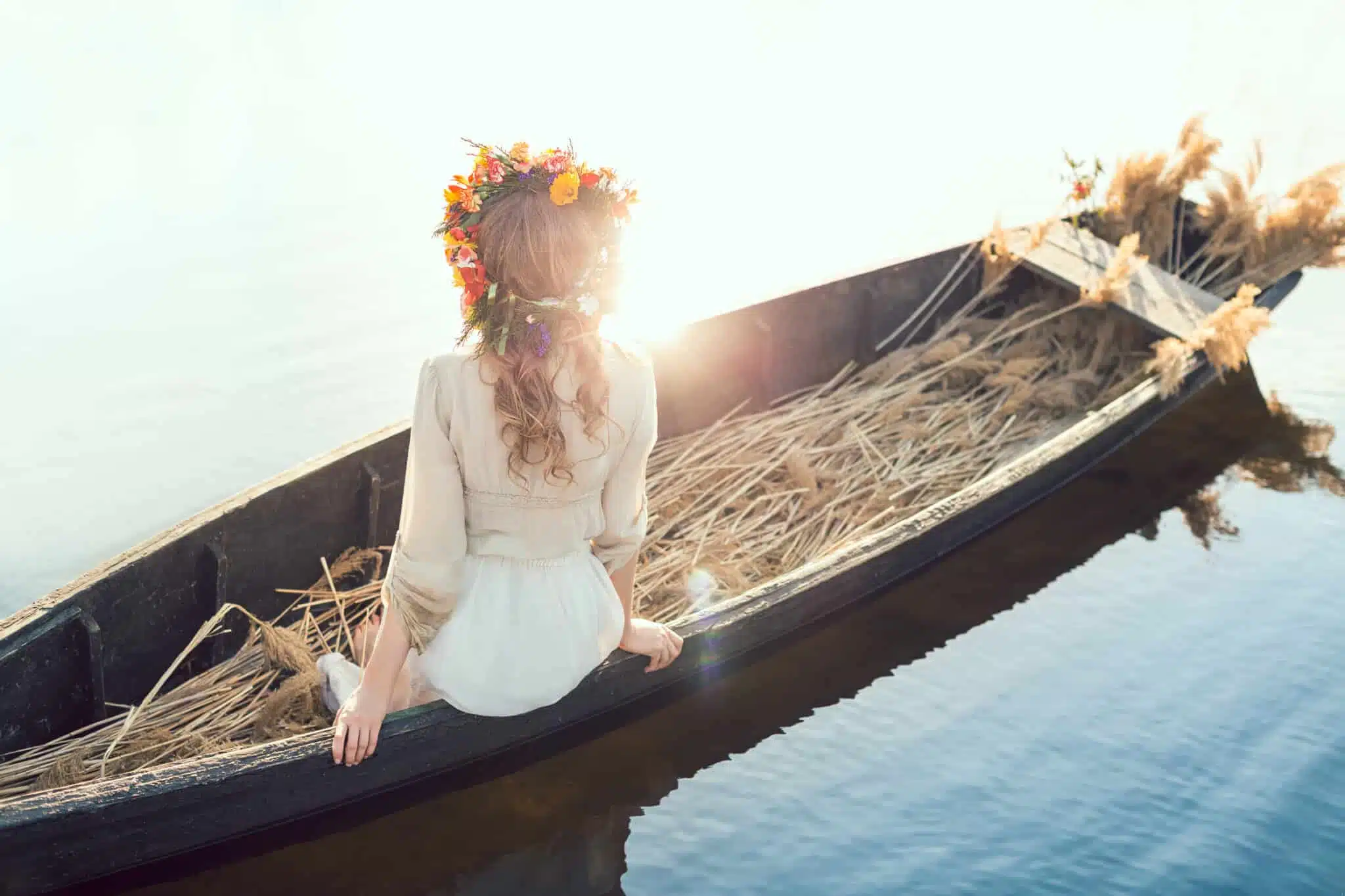
“The Bubble” by William Allingham
See, the pretty Planet!
Floating sphere!
Faintest breeze will fan it
Far or near;
World as light as feather;
Moonshine rays,
Rainbow tints, together,
As it plays;
Drooping, sinking, failing,
Nigh to earth,
Mounting, whirling, sailing,
Full of mirth;
Life there, welling, flowing,
Waving round;
Pictures coming, going,
Without sound.
Quick now! be this airy
Globe repell’d!
Never can the fairy
Star be held.
Touch’d—it in a twinkle
Disappears!
Leaving but a sprinkle,
As of tears.
“I Almost Got to Fairyland One Day” by Mary Carolyn Davies
I almost got to Fairyland, one day—
I walked out straight along the sun-path, so.
And there were little hummings in the world,
And moving things went through the grass, and all
The air was just as glad as if there were
A party, somewhere, at a fairy’s house.
I knew they had a party, and I knew
That they had kept a seat for me, if I
Could only find the right turn in the road.
I was so near to Fairyland, so near
That I could almost hear the fairy gates
Swing open for me, waiting—just for me.
I was so near to Fairyland—and then,
Just then, I heard my mother calling me;
“Come in to supper, dear,” I heard her call;
And so I never got to Fairyland.
I know that there are fairies, though, because
I almost got to Fairyland one day.
“Our Playhouse Is So Near to Fairyland—” by Mary Carolyn Davies
Our playhouse is so near to Fairyland
I think the fairies come and peep, to see
How children play.
So sometimes when there’s something in the grass
That sounds like fairies’ footsteps very faint
Not far away,
We sit quite still, all on the playhouse wall;
But though we wait and wait for them to speak
They never do.
Our playhouse is so near to Fairyland
They’ll come some day, and start to play with us,
I think, don’t you?
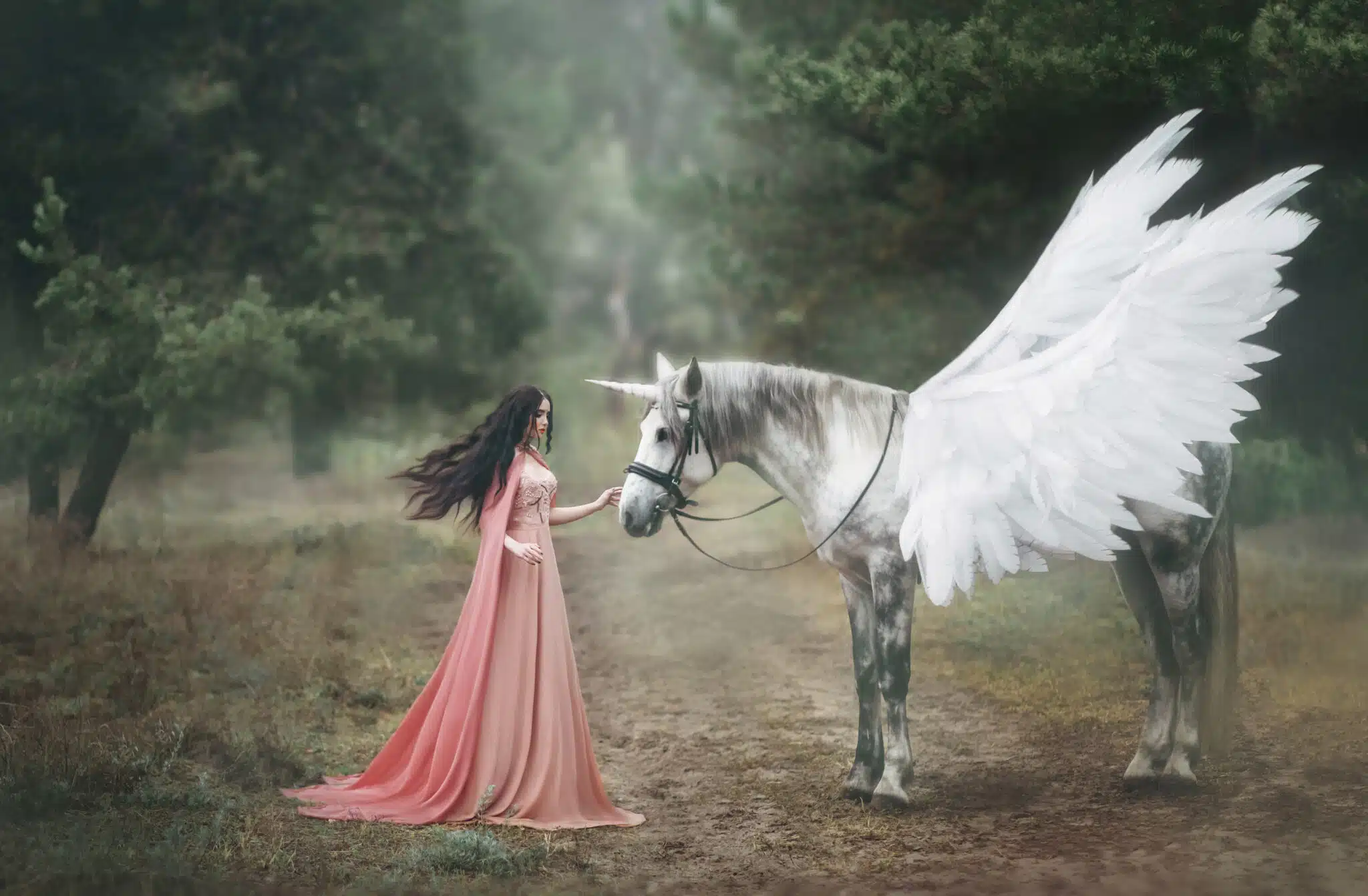
“The Light-Hearted Fairy” by Anonymous
Oh, who is so merry, so merry, heigh ho!
As the light hearted fairy? heigh ho,
Heigh ho!
He dances and sings
To the sound of his wings
With a hey and a heigh and a ho!
Oh, who is so merry, so airy, heigh ho!
As the light headed fairy ? heigh hc,
Heigh ho !
His nectar he sips From the primroses ‘ lips
With a hey and a heigh and a ho!
Oh, who is so merry, so merry, heigh ho!
As the light footed fairy ? heigh ho!
Heigh ho!
The night is his noon And his sun is the moon,
With a hey and a heigh and a ho!
“The Fountain of the Fairies” by Robert Southey
There is a fountain in the forest called
The Fountain of the Fairies: when a child
What a delight of wonder I have heard
Tales of the elfin tribe who on its banks
Hold midnight revelry. An ancient oak,
The goodliest of the forest, grows beside;
Alone it stands, upon a green grass
plat,
By the woods bounded like some little isle.
It ever hath been deem’d their favourite tree,
They love to lie and rock upon its leaves
And bask in moonshine. Here the woodman leads
His boy, and showing him the green sward mark’d
With darker circlets, says the mid night dance
Hath traced the rings, and bids him spare the tree.
Fancy had cast a spell upon the place
Which made it holy ; and the villagers
Would say that never evil things approached
Unpunished there. The strange and fearful pleasure
Which filled me by that solitary spring,
Ceased not in riper years ; and now it wakes
Deeper delight, and more mysterious awe.
“The Palace of the Fairies” by Michael Drayton
This palace standeth in the air,
By necromancy placed there,
That it no tempests needs to fear,
Which way so’er it blow it.
And somewhat southward tow’d the
noon,
Whence lies a way up to the moon,
And thence the fairy can as soon Pass to the earth below it.
The walls of spider’s legs are made Well mortised and finely laid ;
He was the master of his trade,
It curiously that builded ;
The window of the eyes of cats And for the roof, instead of slates ,
Is covered with the skin of bats,
With moonshine that was gilded.
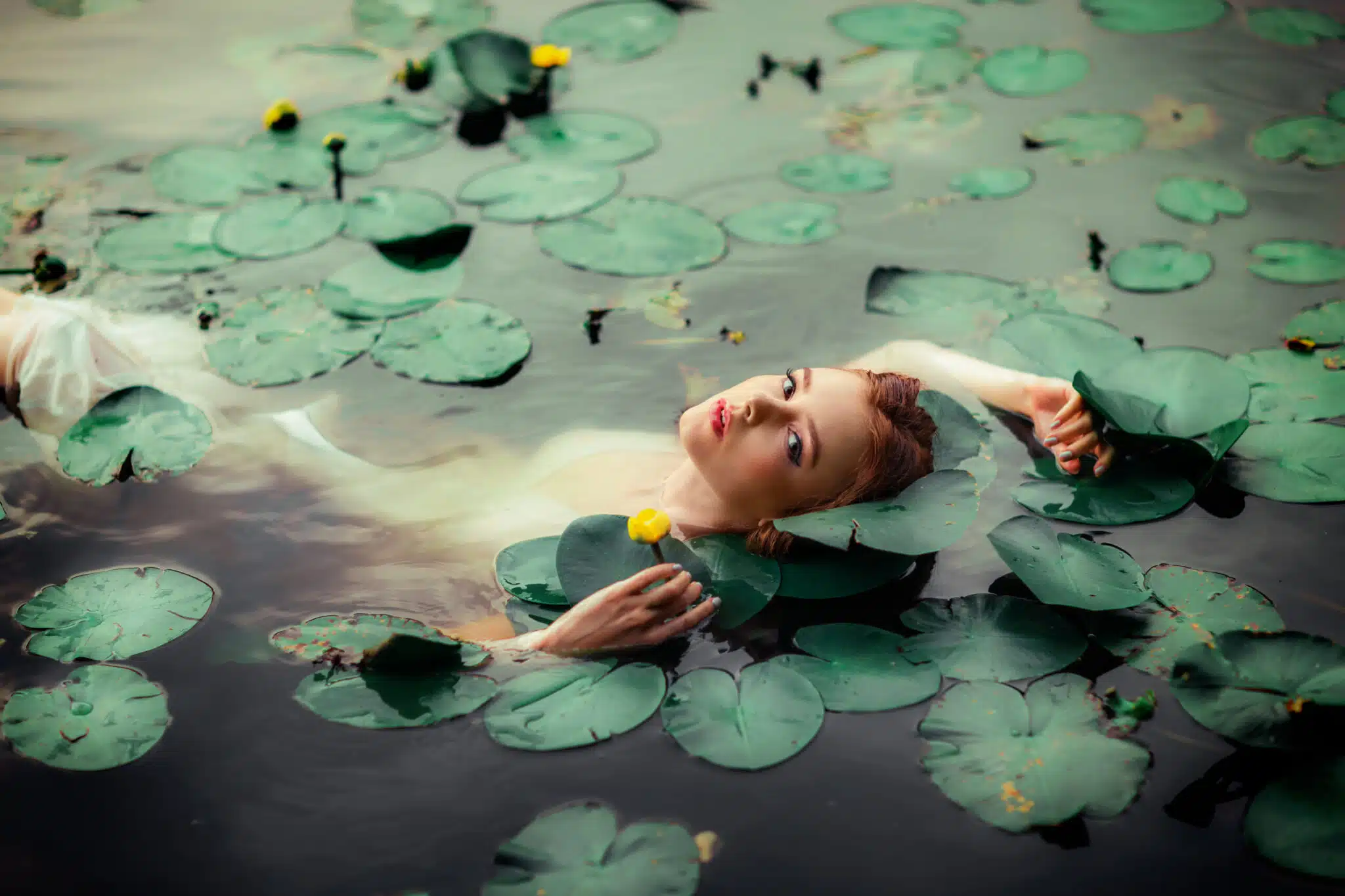
“Water-Lilies” by Felicia Dorothea Hemans
A Fairy Song.
Come away, elves, while the dew is sweet,
Come to the dingles where fairies meet :
Know that the lilies have spread their bells
O’er all the pools in our forest dells ;
Stilly and lightly their vases rest
On the quivering sleep of the water’s breast,
Catching the sunshine through leaves that throw
To their scented bosoms an emerald
glow;
And a star from the depth of each pearly cup,
A golden star unto heaven looks up,
As if seeking its kindred where bright they lie,
Set in the blue of the summer sky.
-Come away ! under arching boughs we’ll float,
Making those urns each a fairy boat ;
We’ll row them with reeds o’er the
fountains free,
And a tall flag-leaf shall our streamer be,
And we’ll send out wild music so sweet and low,
It shall seem from the bright flower’s heart to flow,
As if t’were breeze with a flute’s low sigh,
Or water drops train’d into melody.
-Come away ! for the midsummer sun grows strong,
And the life of the lily may not be long.
“Fairies’ Recall” by Felicia Dorothea Hemans
While the blue is richest
In the starry sky,
While the softest shadows
On the green sward lie,
While the moonlight slumbers In the lily’s urn,
Bright elves of the wild wood
Oh! return, return!
Round the forest fountains,
On the river shore,
Let your silvery laughter Echo yet once more,
While the joyous bounding
Of your dewy feet Rings to that old chorus :
“The daisy is so sweet!”
Oberon, Titania,
Did your starlight mirth With the song of Avon
Quit this work- day earth?
Yet while green leaves glisten
And while bright stars burn,
By that magic memory,
Oh return, return!
“The Fairy Tempter” by Samuel Lover
A fair girl was sitting in the green wood shade,
List’ning to the music the spring birds made;
When sweeter by far than the birds on the tree,
A voice murmured near her, “Oh, come, love, with me—
In earth or air,
A thing so fair
I have not seen as thee!
Then come, love, with me.”
“With a star for thy home, in a
palace of light,
Thou wilt add a fresh grace to the
beauty of night;
Or, if wealth be thy wish, thine are
treasures untold,
I will show thee the birthplace of
jewels and gold And pearly caves
Beneath the waves,
All these, all these are thine,
If thou wilt be mine.”
Thus whispered a fairy to tempt the fair girl,
But vain was the promise of gold and of pearl;
For she said, “Tho’ thy gifts to a poor
girl were dear,
My father, my mother, my sisters are here:
Oh what would be
Thy gifts to me Of earth, and sea, and air
If my heart were not there?
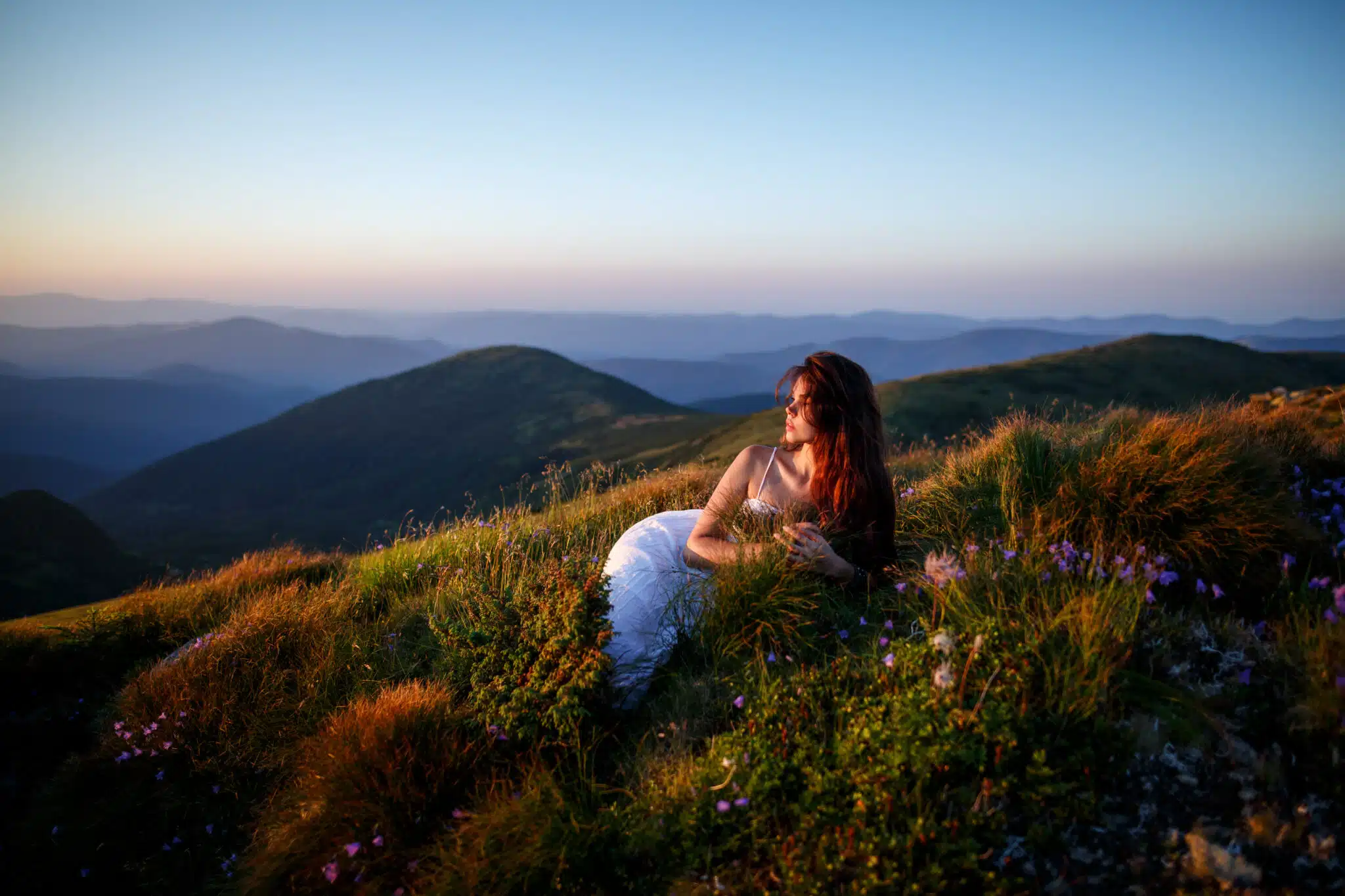
“The Mountain Sprite” by Thomas Moore
In yonder valley there dwelt, alone,
A youth whose moments had calmly flown,
Till spells o’er him, and, day and night,
He was haunted and watched by a
Mountain Sprite!
As once by moonlight he wandered o’er
The golden sands of that island shore,
A foot- print sparkled before his sight
‘Twas the fairy foot of the Mountain Sprite!
Beside a fountain , one sunny day,
As bending over the stream he lay,
There peep’d down o’er him two eyes of light,
And he saw in that mirror the Mountain
Sprite.
He turned, but lo, like a startled bird,
That spirit fled ! and the youth but heard
Sweet music, such as marks the flight
Of some bird of song, from the Mountain
Sprite.
One night, still haunted by that bright look,
The boy, bewildered, his pencil took,
And, guided only by memory’s light,
Drew the once seen form of the Mountain Sprite.
“Oh thou, who lovest the shadow,” cried
A voice, low whispering by his side,
“Now turn and see, “-here the youth’s
delight Seal’d the rosy lips of the Mountain
Sprite.
“Of all the spirits of land and sea,”
Then rapt he murmured, ” there’s none like thee,
And oft, oh oft, may thy foot thus light
In this lonely bower, sweet Mountain Sprite!
